|
The material on this website is intended for educational use only and may not be reproduced for commercial purposes without express permission from the appropriate copyright holder.
Le contenu de ce site Web est destiné à des fins pédagogiques seulement et ne peut être reproduit à des fins commerciales à moins d'en avoir obtenu la permission du titulaire du droit d'auteur approprié.
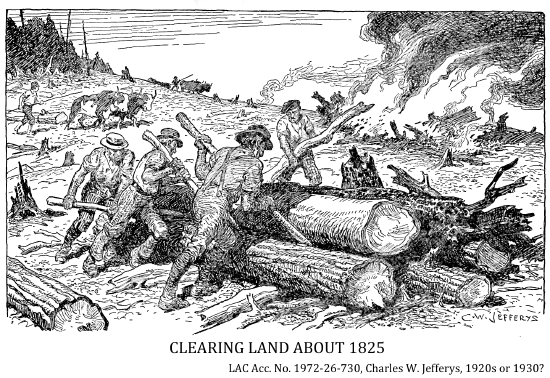
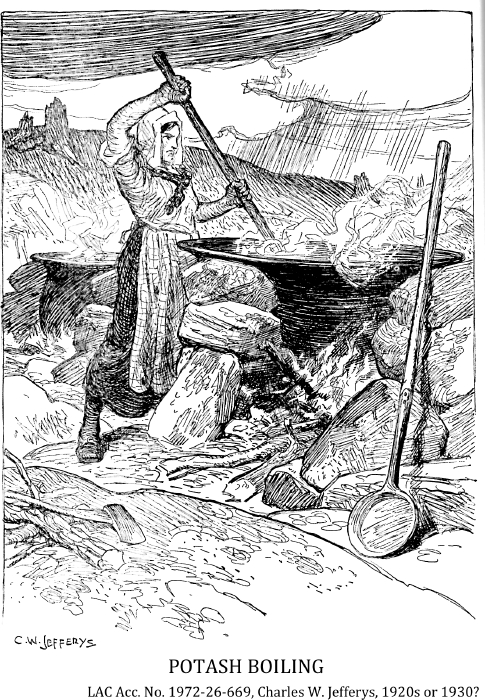
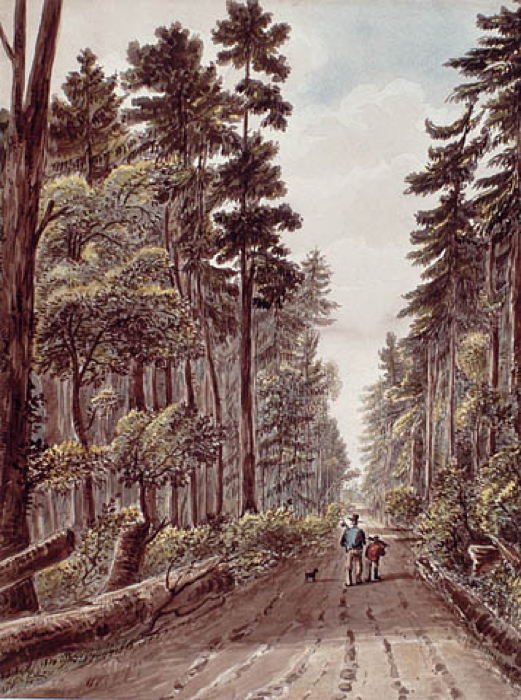
Road Between Kingston and York, Upper Canada. La route de Kingston à York, Haut-Canada. LAC, Acc. No. 1934-402, James Pattison Cockburn ca. 1830
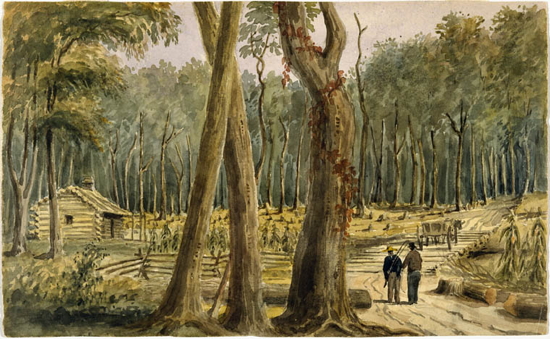
1838 Bush Farm Near Chatham, ca. 1838.Ferme de brousse, près de Chatham, v. 1838. John Philip Bainbrigge ca. 1838
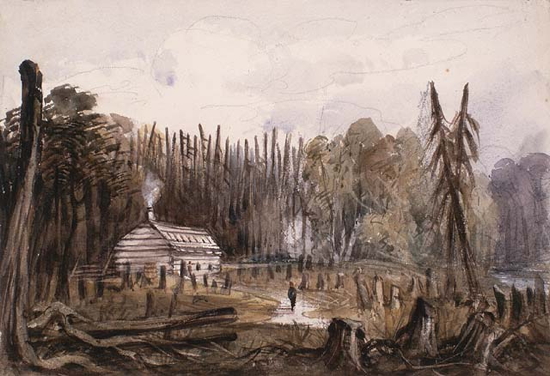
Cabin in the Woods. Cabine dans la forêt.LAC, Acc. No. 1956-62-123 Millicent Mary Chaplin 1838-1842
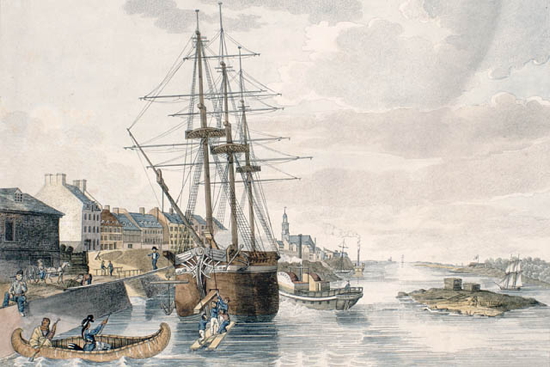
1830 Vue du port, Montréal. View of the Harbour, Montreal. LAC, Acc. No. 1991-116-6, Robert Archmuty Sproule 1830
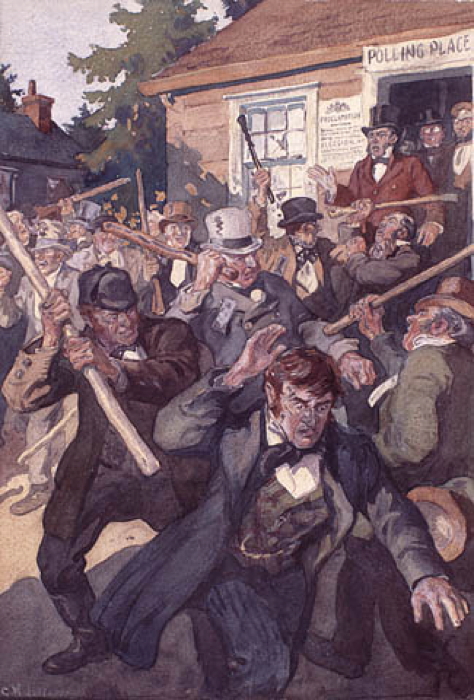
An election during the struggle of responsible Government. Une élection pendant la lutte pour un gouvernement responsable. LAC, 1972-26-1384, Charles Jefferys ca. 1925
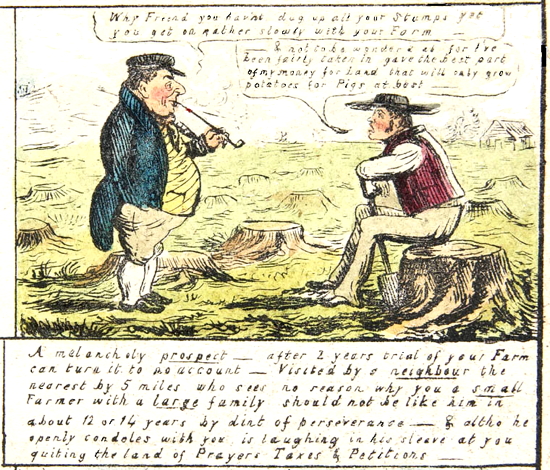
Why Friend you hav'nt dug up all your stumps yet you get on rather slowly with your Farm ¬–
– & not to be wondered at for I've been fairly taken in gave the best part of my money for land that will only grow potatoes for Pigs at best –
A melancholy prospect – after 2 years trial of your Farm can turn it to no account – Visited by a neighbour the nearest 5 miles who sees no reason why you a small Farmer with a large family should not be like him in about 12 or 14 years by dint of perseverance – & altho he openly condoles with you is laughing in his sleave at you quitting the land of Prayers, Taxes & petitions –
Emigration, detailing The Progress and Vicissitudes of an Emigrant/ Dedicated to all those who would leave their native Country to seek a better condition in a distant Foreign Land.. LAC Acc. No. R9266-3518, Peter Winkworth Collection of Canadiana, C. J. Grant, London, 1833
"Why do they talk of responsible government when we have responsible government? As Governor of this country [Upper Canada] I am responsible to the King."
Sir Peregrine Maitland, Lieutenant Governor of Nova Scotia 1828
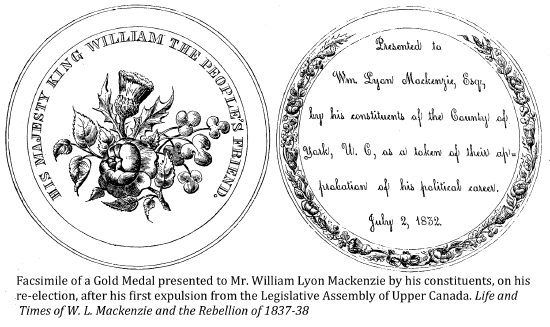
"Your triumphant election of the 16th and ejection from the Assembly on the 17th must hasten the crisis which is fast approaching in the affairs of the Canadas, and which will terminate in independence and freedom from the baneful domination of the mother country, and the tyrannical conduct of a small and despicable faction in the colony."
Joseph Hume, letter to W. L. Mackenzie, 29 March 1834
"I have long seen the country in the hands of a few shrewd, crafty, covetous men under whose management one of the most lovely and desirable sections of America remained a comparative desert."
William Lyon Mackenzie
"Until my return from England in the fall of 1833, I used what little influence I possessed with the yeomanry to persuade them that by petitioning England, a remedy would be found to every wrong of which they had just reason to complain . . . But I have been in England – I have . . . seen enough to convince me that we shall continue to have the very worst possible government in Upper Canada until we get rid of the system which binds us to the earth. I therefore am less loyal than I was."
William Lyon Mackenzie, Letter to John Neilson
"With a Scotsman's idea of justice and freedom Mr. Mackenzie felt a longing desire to right the wrongs he saw everywhere around him. This constituted, as he believed, his mission as a public man in Canada, and it furnishes the key to his life."
Egerton Ryerson
"Nobody would ask for the vote by ballot but from gross ignorance; it is the most corrupt way of using the franchise."
John Strachan, 1835
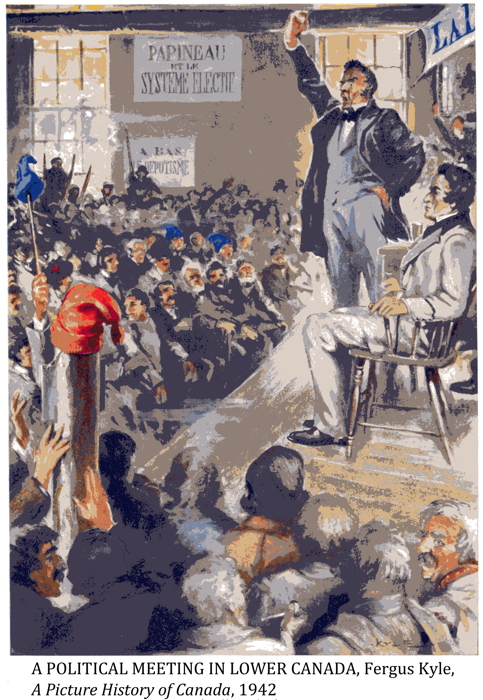
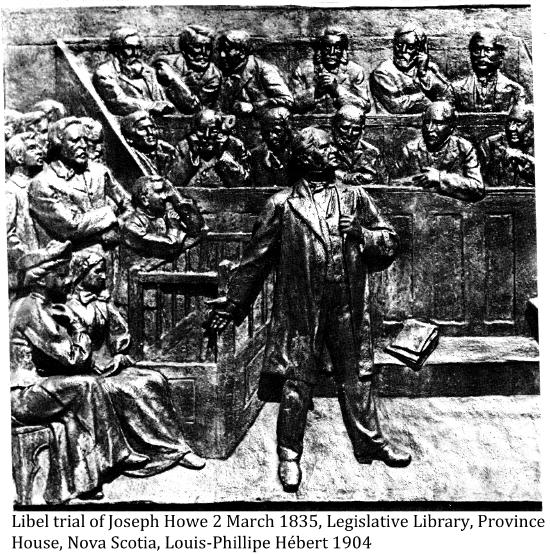
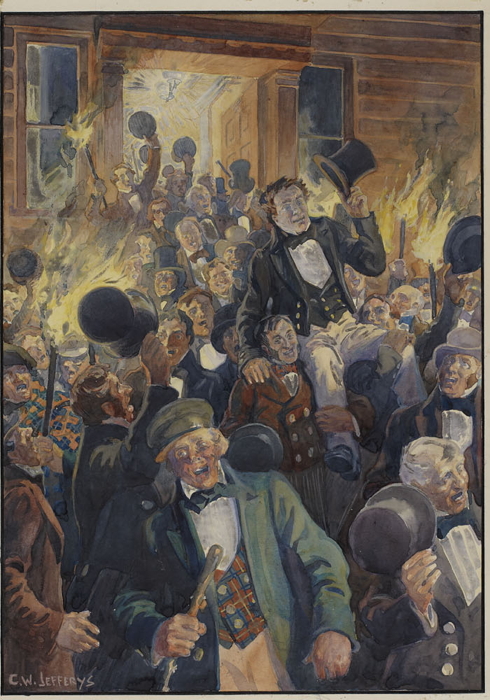
1935 Joseph Howe after a Halifax Triumph. LAC, Acc. No. 1972-26-764, Charles Jefferys 1920s or 1930s?
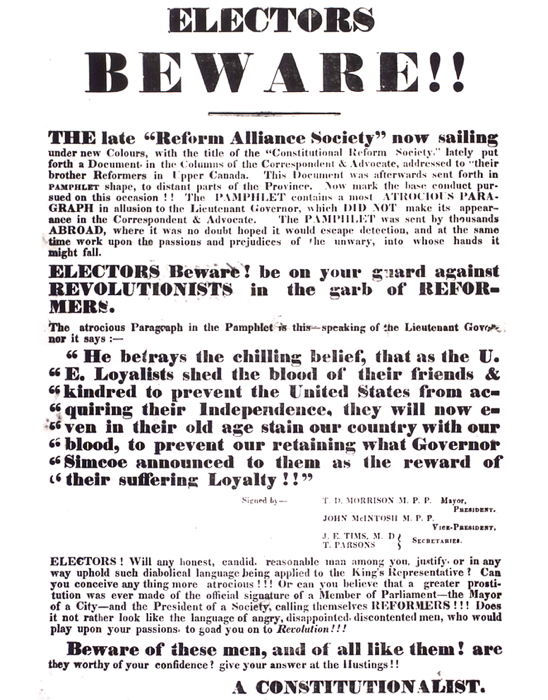
Electors Beware!! Toronto Reference Library 1836. Reform Alliance Society. SB
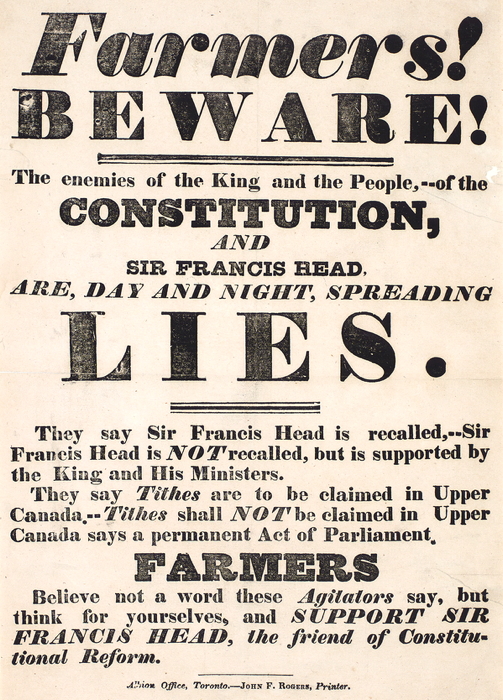
Farmers Beware!, Toronto Reference Library 1836 Farmers. M
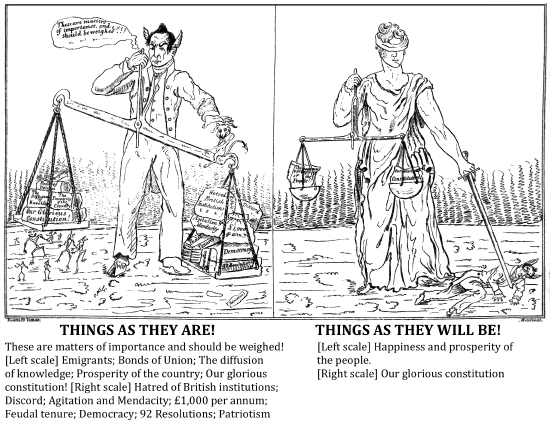

1837 Papineau s'adressant à une foule. Papineau addressing a crowd. LAC, Acc. No. 1972-26-759, Charles Jeffreys ca. 1925
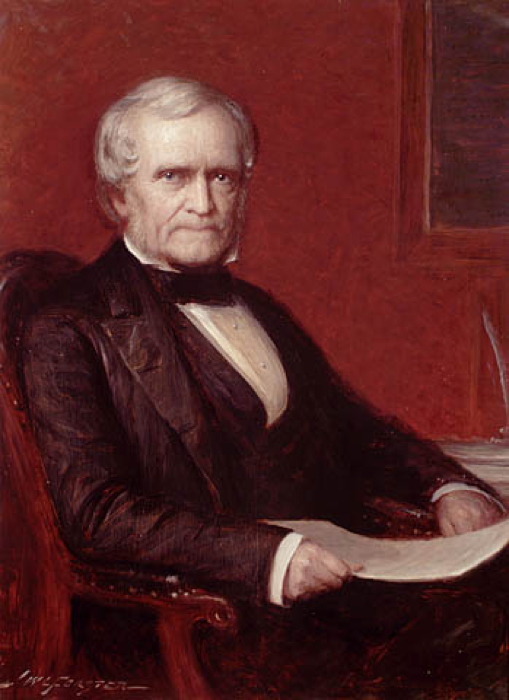
William Lyon Mackenzie. LAC, 1996-115-1, John Wycliffe Lowes Forster 1931
"I have constantly identified myself with the common people of this country."
William Lyon Mackenzie
"Well may I love the poor, greatly may I esteem the humble and lowly, for poverty and adversity were my nurses, and in youth want and misery my familiar friends; even now it yields a sweet satisfaction to my soul, that I can claim kindred with the obscure cottar, and the humble labourer, of my native, ever honoured, ever loved Scotland."
William Lyon Mackenzie, Colonial Advocate , 10 June 1824
"There are those doubtless who fear the ignorance of the people of Upper Canada; I, on the other hand, stand more in dread of rulers like ours who are virtually independent of them. The people have an interest in good government, but the rulers have a gain by misrule."
William Lyon Mackenzie, Colonial Advocate , 14 July 1831
"We would have no aristocracy in this country, but the aristocracy of merit, no order but the order of merit."
W. H. Howland
"The backwoodsman, while he lays the axe to the root of the oak in the forests of Canada, should never forget that a base basswood is growing in his native land, which, if not speedily girdled will throw its dark shadows over the country and blast its best exertions. Look up, reader, and you will see the branches – the Robinson branch, the Powell branch, the Jones branch, the Strachan branch, the Boulton twig, etc. The farmer toils, the merchant toils, the labourer toils, and the Family Compact reap the fruit of their exertions."
William Lyon Mackenzie, Patrick Swift's Almanac , 1834
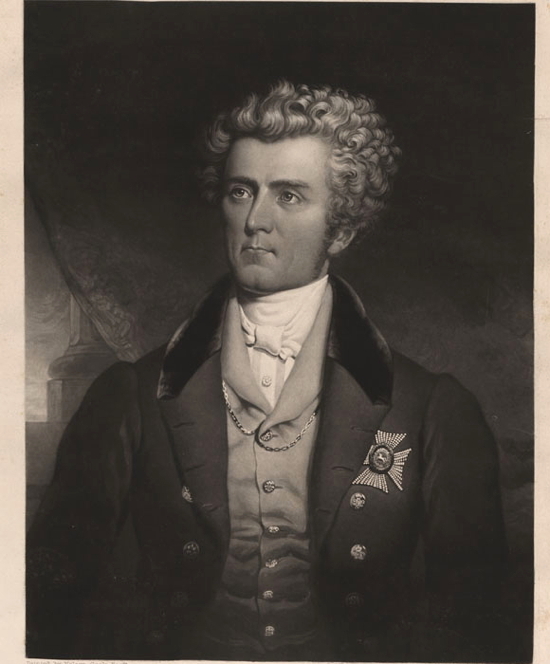
His Excellency Sir Francis Bond Head, Lieutenant-Governor of Upper Canada. LAC, Acc. No. R9266-3153, 10, Nelson Cook October 1837
"The 'family compact' of Upper Canada is composed of those members of society who, either by their abilities and character have been honoured by the confidence of the executive government, or who by their industry and intelligence, have amassed wealth. The party, I own, is comparatively a small one, but to put the multitude at the top and the few at the bottom is a radical reversion of the pyramid of society which every reflecting man must foresee can end only by its downfall."
Sir Francis Bond Head, A Narrative , 1838
"I had sooner wear for the rest of my life the gaudy plush breeches and waistcoat of a London footman, than endure the stench of that society where all men are called equal. There is nothing I foresee more closely than the inevitable downfall of democracy in America."
Sir Francis Bond Head, 24 May 1837
"That I was sentenced to contend on the soil of America with Democracy, and that if I did not overpower it, it would overpower me, were solemn facts which for some weeks had been perfectly evident to my mind."
Sir Francis Bond Head
"Afraid to look me in the face, he sat with his feet not reaching the ground . . . while, with the eccentricity , the volubility, indeed the appearance of a madman, the tiny creature raved in all directions about grievances here and grievances there."
Sir Francis Bond Head, 1837
"The people of Upper Canada detest democracy . . . and are, consequently, staunch in allegiance to their King."
Sir Francis Bond Head, Declaration, 20 June 1837
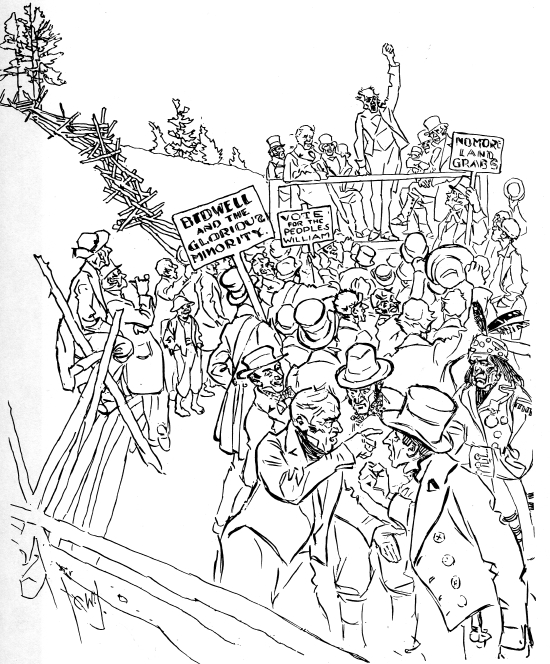
A Political Meeting at "The Corners", 1837. LAC, 1972-26-588, Charles W. Jefferys, 1920s or 1930s?
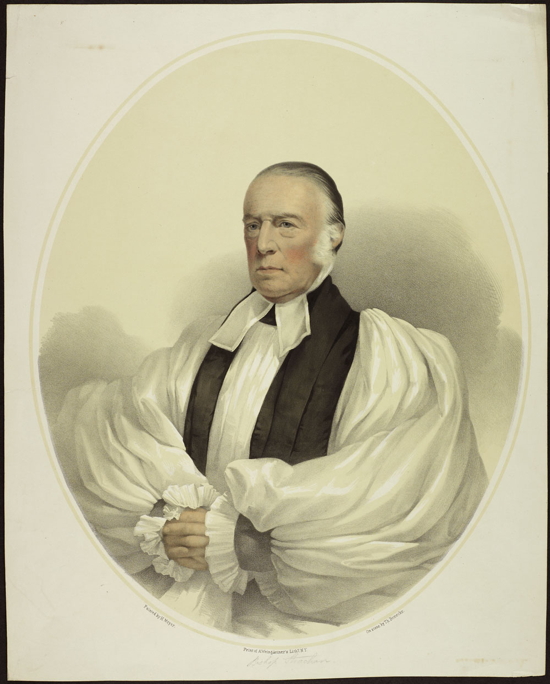
Bishop Strachan. LAC e010952216-v8
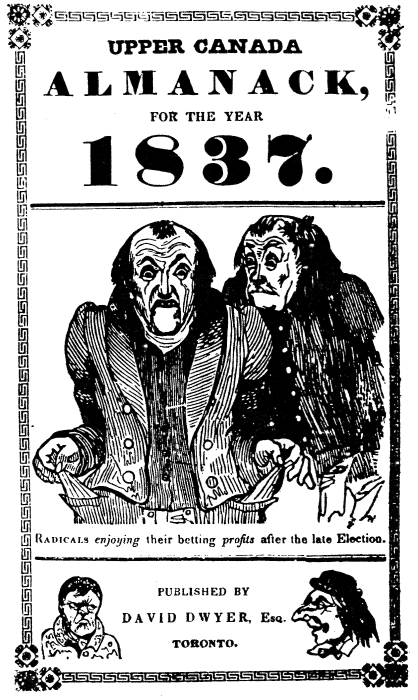
"The decade 1827-37 was one of those periods in which it is possible to observe, step by step, the gradual accumulation of tension between contending classes, which finally can only be resolved by revolution."
Stanley Ryerson, 1837 The Birth of Canadian Democracy
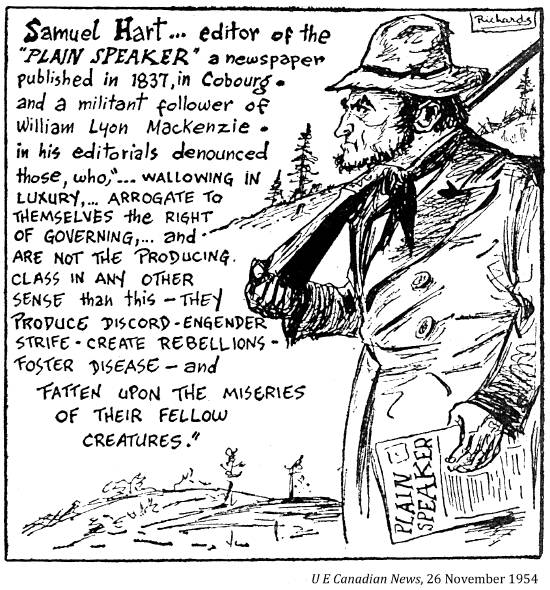
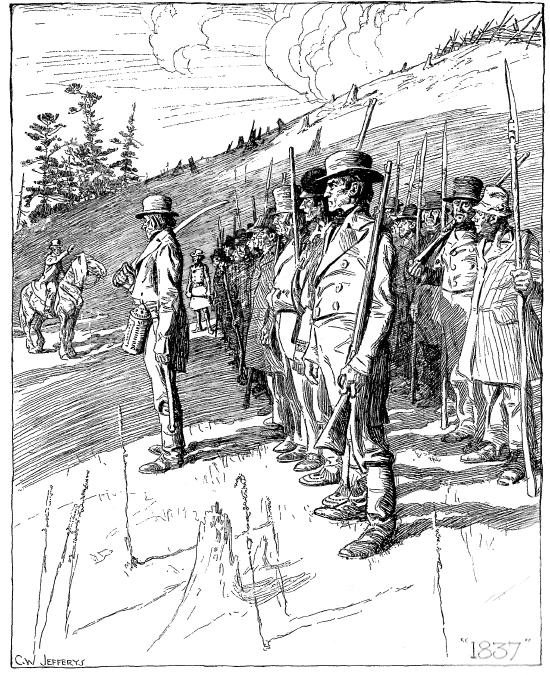
Rebels drilling in North York in autumn, 1837. LAC, Acc. No. 1961-29(34). Charles W. Jefferys, 1920s or 1930s?
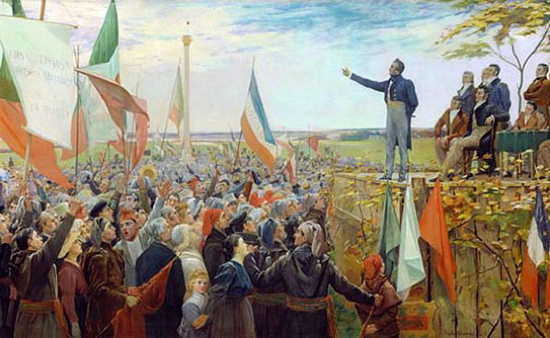
1837 10 24 The gathering of patriots at Saint-Charles, Lower Canada on October 23 and 24. Painting by Charles Alexander Smith
"As for me, I am of a different opinion from that of M. Papineau. I claim . . . the time has come to melt down our tin plates and spoons to make bullets."
Doctor Wolfred Nelson, St. Charles, 23 October 1837
"We have been oppressed by the hand of a Transatlantic power, and unjustly and cruelly castigated with the rod of unrelenting misrule for a long series of years – so long that the measure of Tyranny has filled to overflowing."
Robert Nelson, Proclamation, March 1838
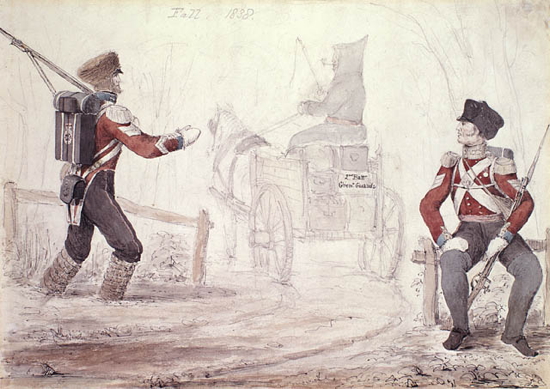
1837 Officers of the Second Battalion, Grenadier Regiment of Foot Guards. Officiers du 2e Bataillon du Régiment d'infanterie des grenadiers. LAC, 1970-188-1497 Collection de Canadiana W.H. Coverdale. James Hope- Wallace 1838. The Grenadier Guards were brought from England to suppress the rebellions of 1837-38.
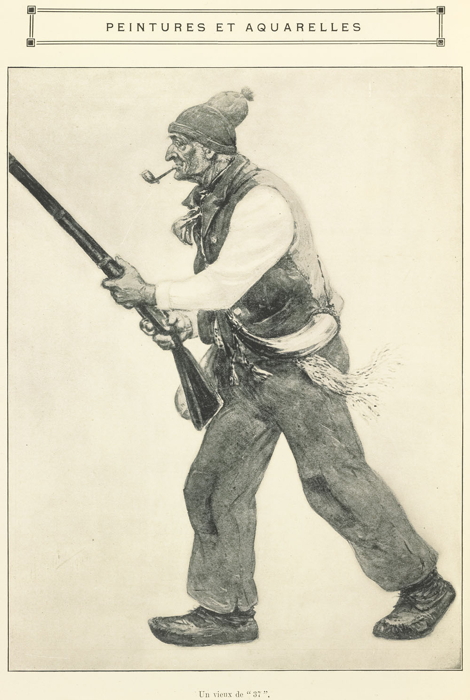
Un vieux de "37". LAC, Acc. No. 1932-266, drawing by Henri Julien, ca.1916
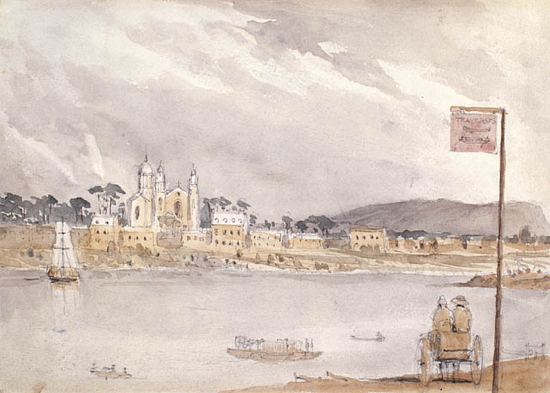
View of St. Denis / Vue de Saint-Denis. LAC, Acc. No. 1983-47-63, John Philip Bainbrigge, 1837
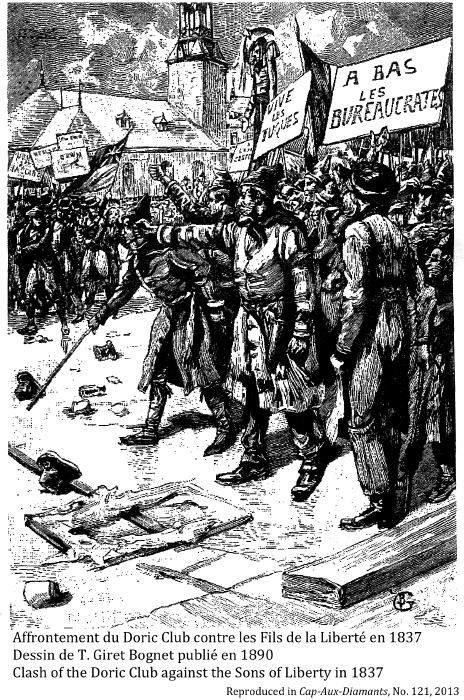
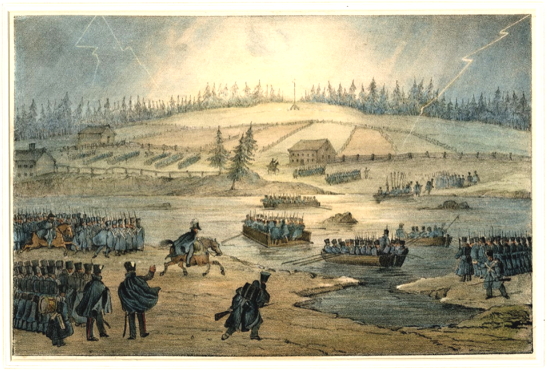
Passage of the Richelieu by Night Traverse´ele la rivie`re Richelieu la nuit, 22 November 1837, N. Hartnell, National Archives of Quebec, 1840
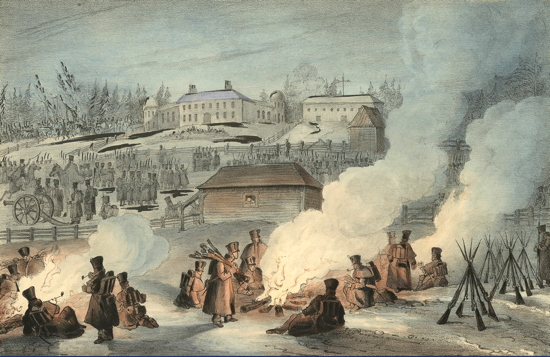
Colonel Wetherall's Bivouac at St. Hilaire de Rouville (Mont-Saint-Hilaire, Quebec), 23 November 1837, London TRL JRR 1875 Cab IV (Beauclerk), 1840
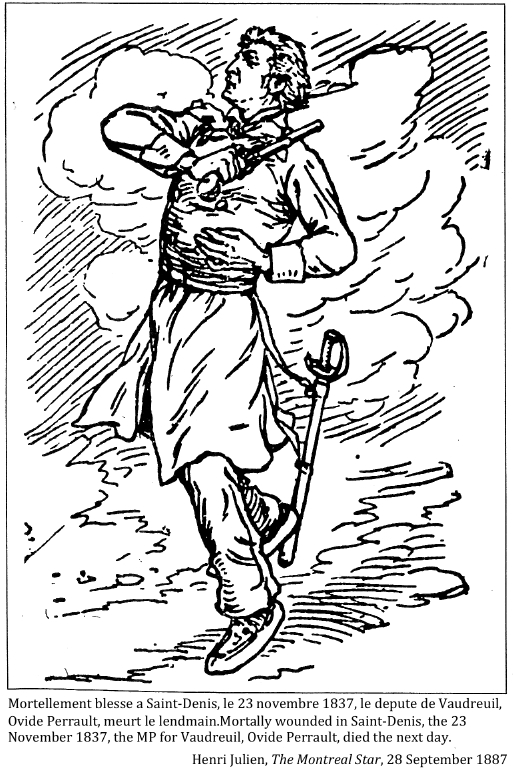
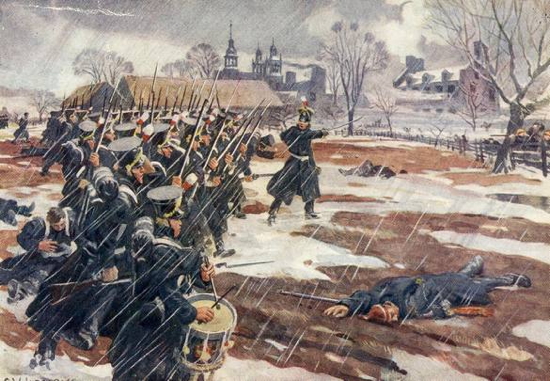
1838 11 23 Battle of St. Denis
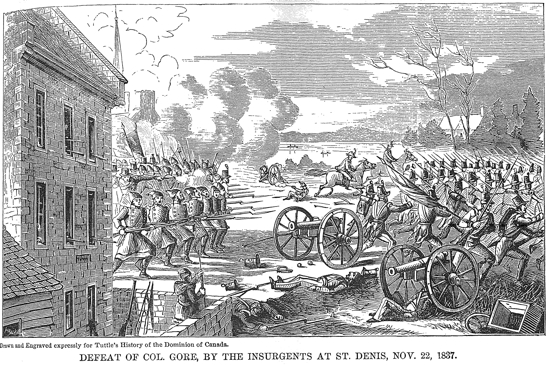
1837 Short History of the Dominion of Canada, Charles R. Tuttle, 1878
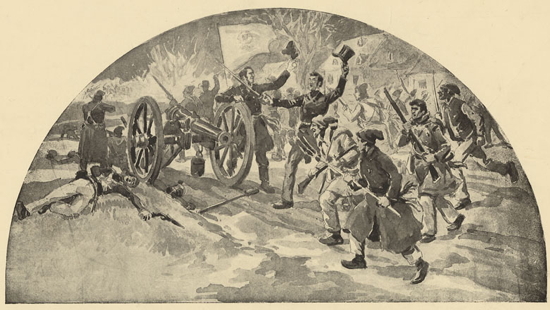
1837 11 23 St. Denis. LAC, Acc. No. 1984-164-19 Source: Mr. Laurent Allard, Laval, Québec. Henri Julien, 1887
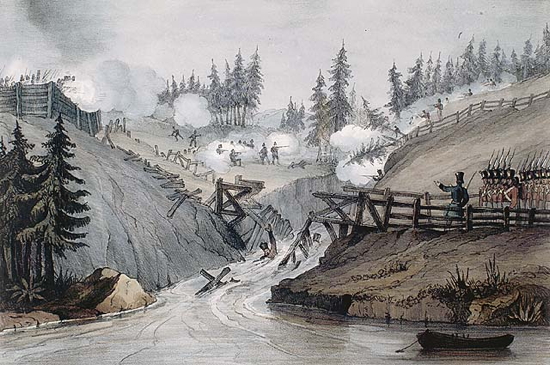
1837 11 25 Défilé fortifié. Le colonel Wetherall avançant pour prendre Saint-Charles, 25 novembre 1837. A Fortified Pass. Colonel Wetherall Advancing to the Capture of St. Charles, 25th November, 1837. LAC, Acc. No. 1992-566-5, Charles Beauclerk 1840
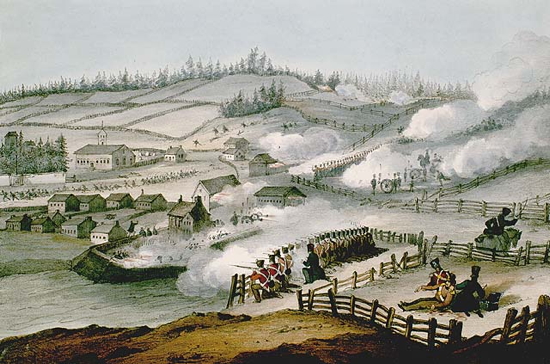
1837 11 25 The British attacked the Patriots at St. Charles. LAC, Acc. No. R9266-3308, Charles Beauclerk March 1840
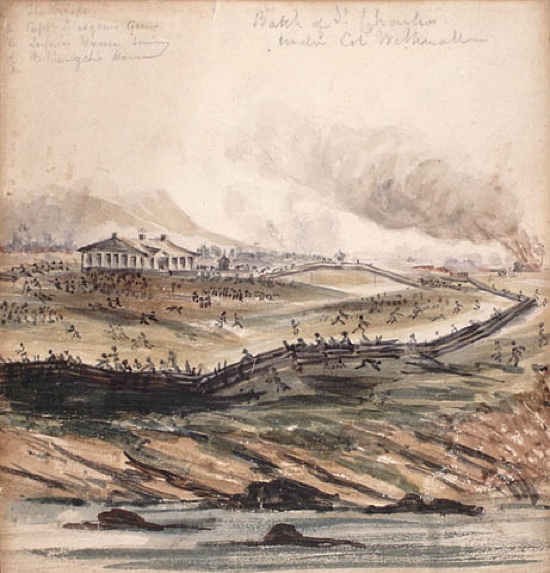
1837 11 25 The Battle of St. Charles. Battle defending the manor house. LAC, Acc. No. 1982-114-1, Edward Adams Clark [1837]
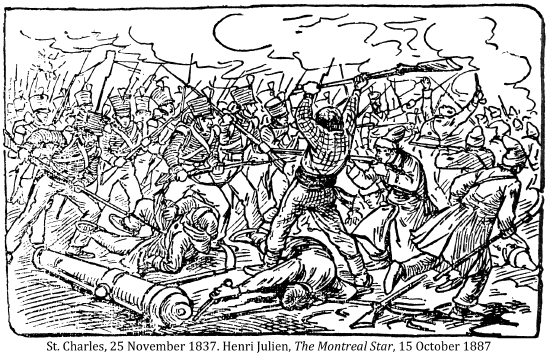
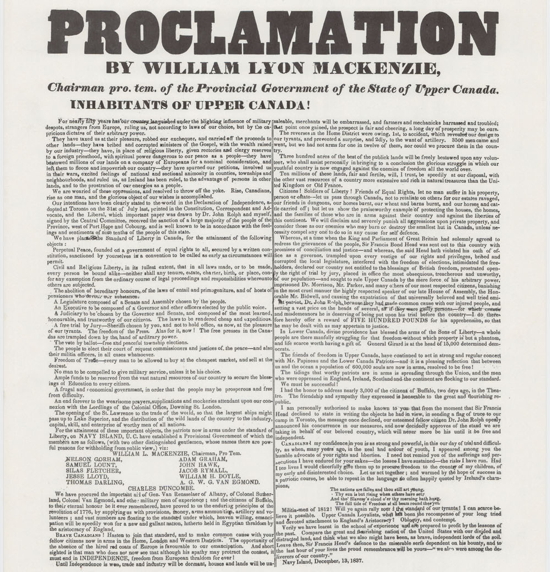
Proclamation. LAC, Acc. No. 1984-4-900, 1837
"The struggle has begun – it might end in freedom – but timidity, cowardice, or tampering on our part will only delay its close. We cannot be reconciled to Britain – we have humbled ourselves to the Pharoah of England, to the Ministers, and great people, and they will neither rule us justly nor let us go – we are determined never to rest until independence is ours – the prize is a splendid one."
William Lyon Mackenzie
"Rise Canadians! Rise as one many, and the glorious object of our wishes is accomplished."
William Lyon Mackenzie
"Canadians? Do you love freedom? I know you do. Do have oppression? Who dare deny it? Do you wish perpetual peace, and a government founded upon the eternal heaven-born principle of the Lord Jesus Christ––a government bound to enforce the law to do to each other as you would be done by? Then buckle on your armour, and put down the villains who oppress and enslave our country . . . One short hour will deliver our country from the oppressor; and freedom in religion, peace and tranquility, equal laws and an improved country will be the prize . . . Up then, brave Canadians! Get ready you rifles, and make short work of it."
William Lyon Mackenzie, 27 November 1837
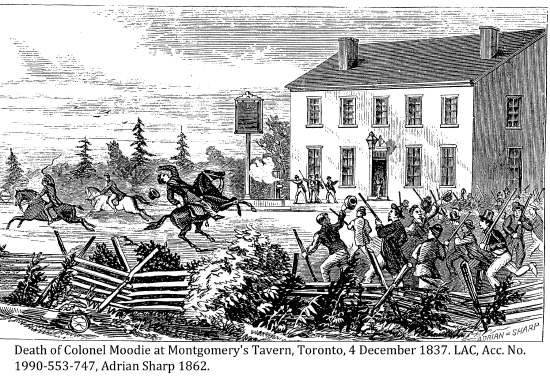
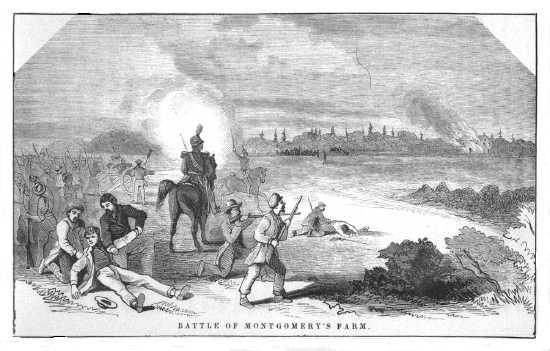
Battle of Montgomery's Farm. Bataille de la ferme Montgomery. LAC Acc. No. 1990-553-742, 1862
"I carried my musket in '37."
Sir John A. Macdonald
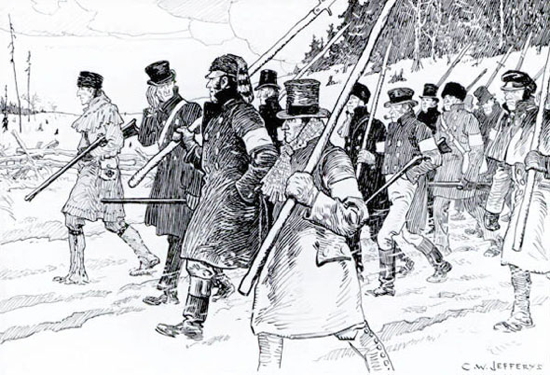
Rebels Marching Down Yonge Street to Attack Toronto, December, 1837. LAC, 1972-26-706. Charles W. Jefferys, 1920s or 1930s?
"The honest backwoodsmen, perfectly ignorant of the abuses that had led to the present position of things, regarded the rebels as a set of monsters, for whom no punishment was too severe, and obeyed the call to arms with enthusiasm. The leader of the insurgents must have been astonished at the rapidity with which a large force was collected, as if by magic, to repel his designs. A great number of those volunteers were half-pay officers, many of whom had fought in the continental wars with the armies of Napoleon, and would have been found a host in themselves. I must own that my British spirit was fairly aroused, and, as I could not aid in subduing the enemies of my beloved country with my arm, I did what little I could to serve the goods cause with my pen."
Susanna Moodie, Roughing it in the Bush
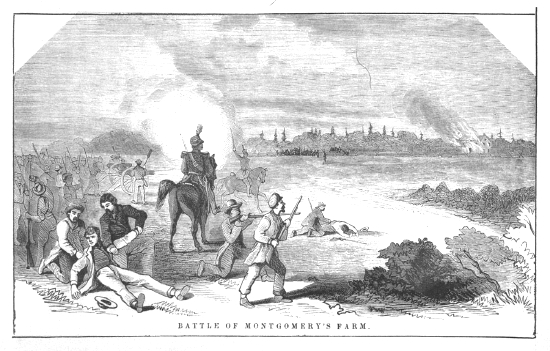
Battle of Montgomery's Farm is torched. LAC, Acc. No. 1990-553-743, unknown
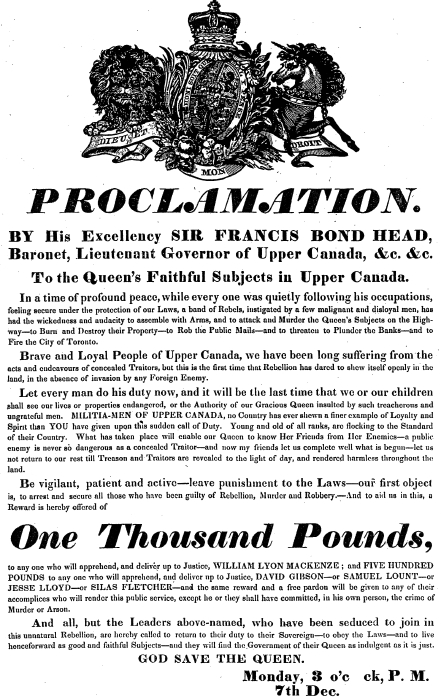
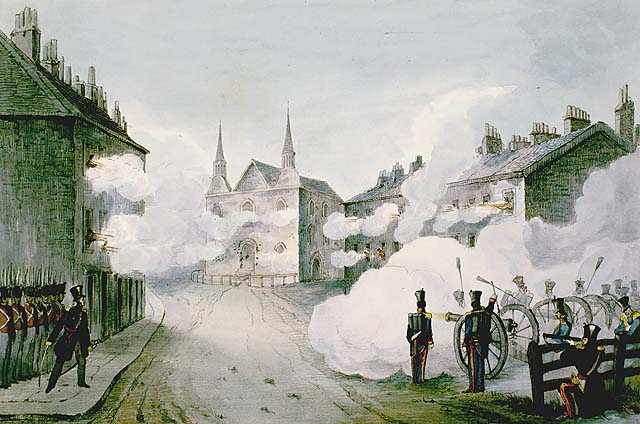
1837 12 14 Vue de la façade avant de l'église de Saint-Eustache occupée par les insurgés. L'artillerie tente de forcer une entrée. Front view of the Church of St. Eustache Occupied by the Insurgents. The Artillery Forcing an Entrance 14th December 1837. LAC, Acc. No. 1992-566-2. Lord Charles Beauclerk March 1840
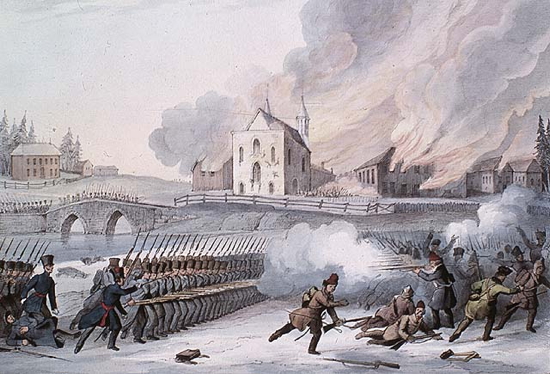
1837 12 14 Vue de la façade arrière de l'église de Saint-Eustache et dispersion des insurgés. "Back View of the Church of St. Eustache and Dispersion of the Insurgents.". LAC, Acc. No. 1992-566-6, Charles Beauclerk March 1840
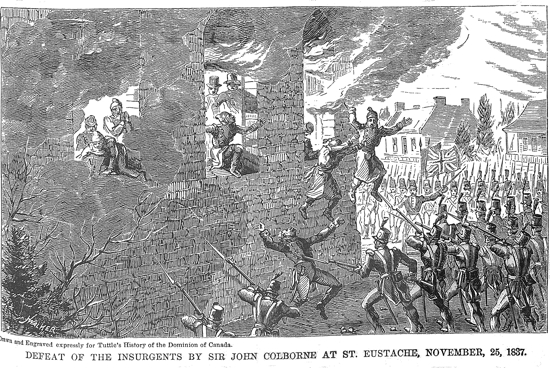
1837 Short History of the Dominion of Canada, Charles R. Tuttle, 1878
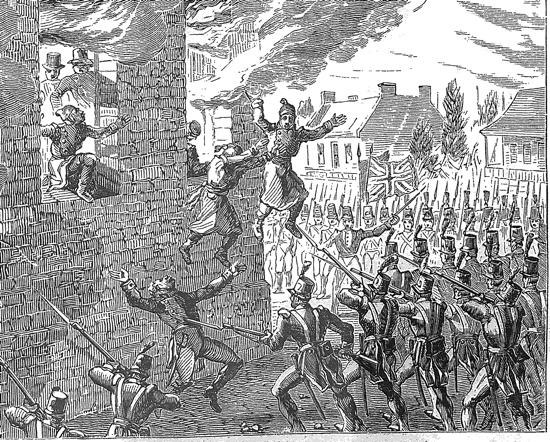
1837 Short History of the Dominion of Canada, Charles R. Tuttle, 1878
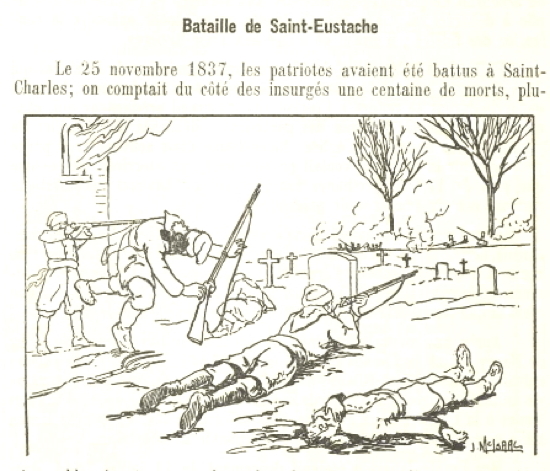
Eustache, 23 November 1837, Elie de Salail, 366 Anniversaires Canadiens, James McIsaac, 1949
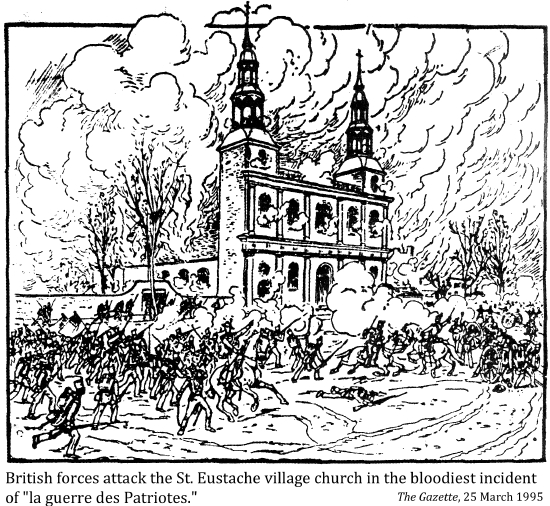
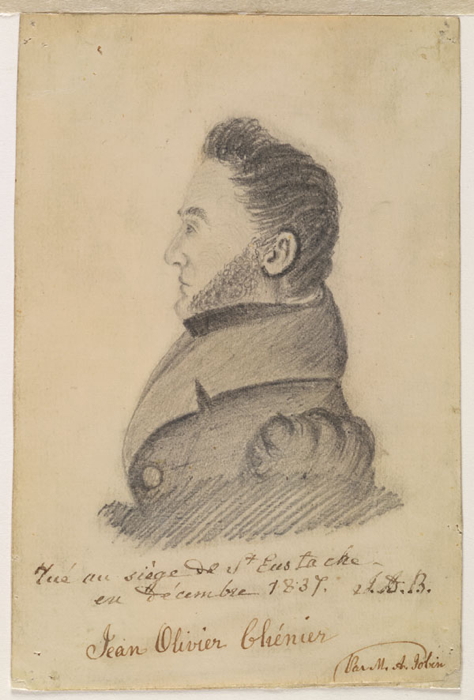
Jean Olivier Chenier
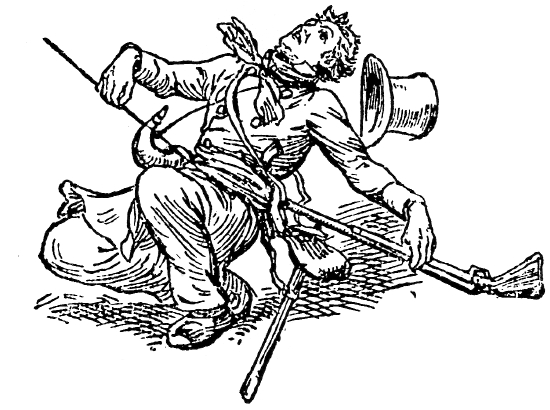
Dr. Jean Olivier Chenier's death at the battle of St. Eustache, Dec. 14, 1837. LAC, Acc. No. 1990-553-966E, ca. 1890
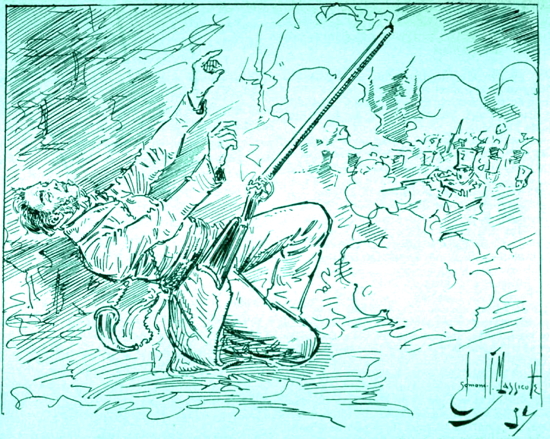
A musket ball hit Chenier in the chest. He died facing the enemy, J. Massicotte
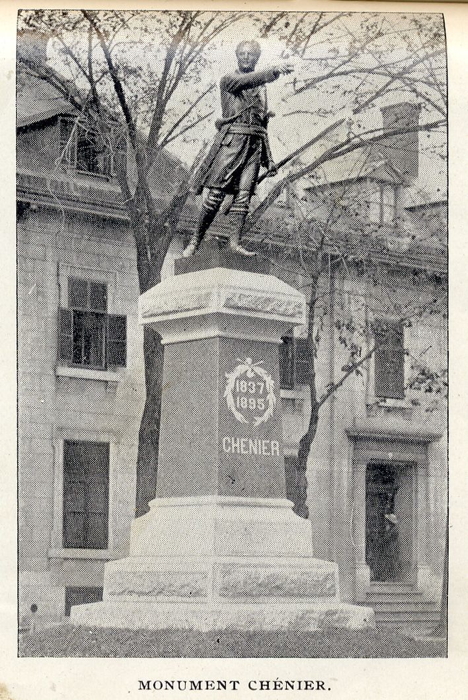
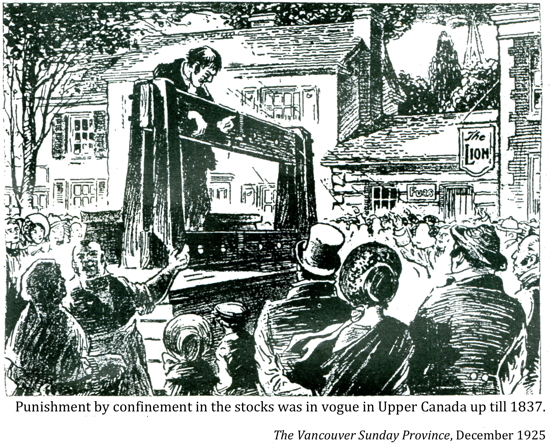
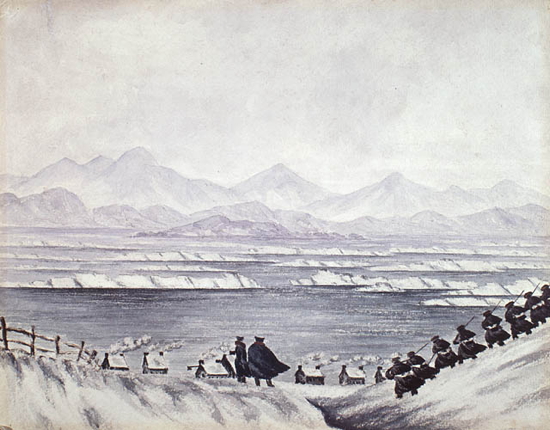
St. Lawrence River in Winter, the 43rd Regiment Marching to Canada from New Brunswick / Le Saint-Laurent en hiver, marche du 43ième Régiment du Nouveau Brunswick. LAC C-005207, Richard George Augustus Levinge, 23 December 1837
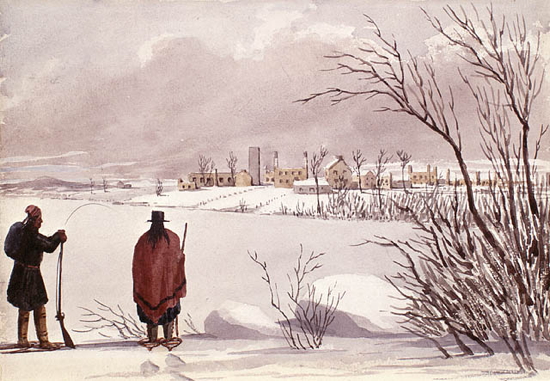
1837 12 14 Les ruines de Saint-Eustache, Bas-Canada. Ruins of St. Eustache, Lower Canada, after it was burned by the British. Acc. No. 1983-47-94, Charles Philip Bainbrigge after 14 December 1837
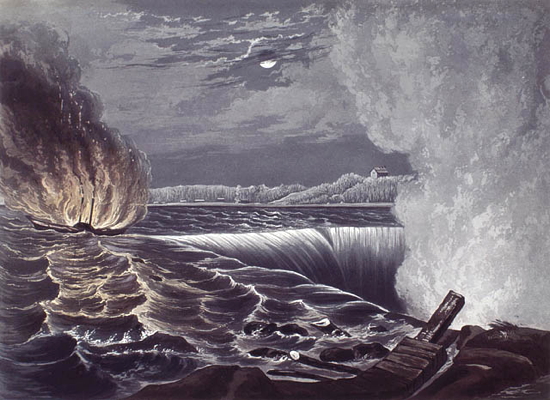
The destruction of the Caroline, steamboat, by fire at the Falls of Niagara Upper Canada, on the Night of Friday the 29th Decr 1837. Le bateau à vapeur Caroline détruit par les flammes aux chutes Niagara, Haut-Canada, dans la nuit du vendredi 29 décembre 1837. LAC, C-004788 George Tattersall 1838
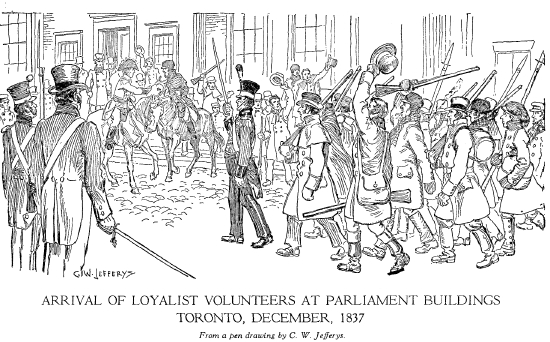

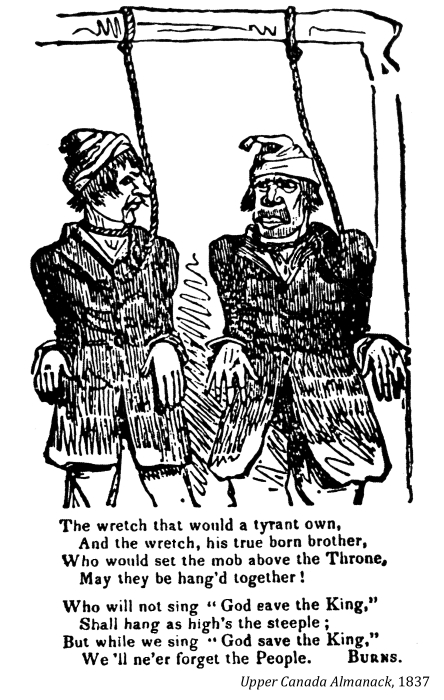
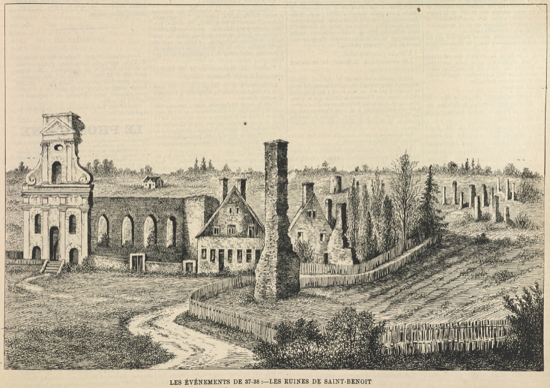
Vue d'une partie des ruines du Village de St. Benoît,. Depicting View Of Aftermath Of Fight & Fire In St. Benoît, Québec, 1838. J.J. Girouard visited St. Benoît between his periods of incarceration. LAC, Acc. No. 1984-81-73, Jean-Joseph Girouard 1838
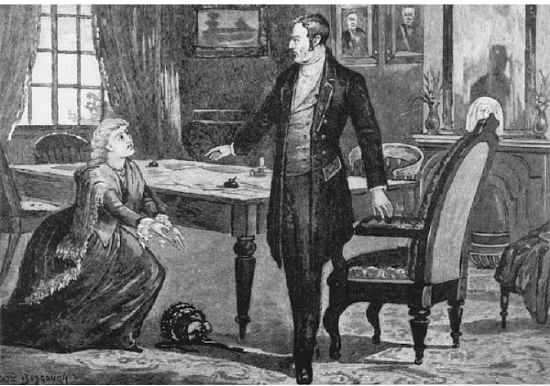
Elizabeth Lount interceding with Sir George Arthur. LAC, Acc. No. 1990-553-750, William Bengough, 1863-1932 unknown
"Be of good cheer, boys. I am not ashamed of anything I've done. I trust in God, and I'm going to die like a man."
Samuel Lount
"I'll not put a hand to it [build the scaffold]. Lount and Mathews have done nothing that I might not have done myself, and I'll never help to build a gallows to hang them."
Joseph Sheard, 1838
"At eight o'clock today, Thursday, 12th April, 1838, Lount and Mathews were executed. The general feeling is in total opposition to the execution of those men. Sheriff Jarvis burst into tears when he entered the room to prepare them for execution. They said to him very calmly, 'Mr. Jarvis, do your duty, we are prepared to meet death and our Judge."
Egerton Ryerson, The Story of My Life , 1883
"Sir Francis deserves impeachment just as much as Samuel Lount deserves execution. Morally speaking, I cannot but regard him as the more guilty culprit of the two."
Egerton Ryerson
"Canada will do justice to his memory – Canadians cannot long remain in bondage. They will be free. The lion will give way, and a bold star will eventually ornament the Canadian standard sheet. Then will the name of Canadian martyrs be sung by poets and extolled by orators, while those who now give law to the bleeding people of Canada will be loathed or forgotten by the civilized world."
Elizabeth Lount, letter to the chief justice of Upper Canada, John Beverley Robinson,
12 June 1838
"Those men with whom my husband acted were moved by the impulse of noble and generous sympathies. They panted not for office, for those they enjoyed––they thirsted not for blood, for Canadians were their brothers––they were determined to drive a Nero from his throne, to rid Canada of a tyrant and to effect a civil revolution that would give happiness and prosperity to the country."
Elizabeth Lount, 1838
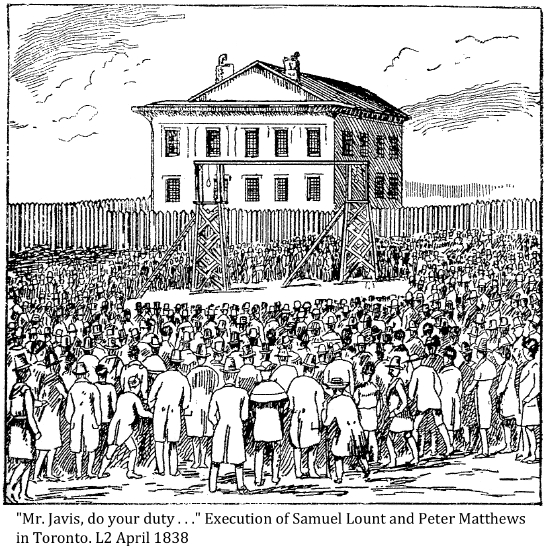
City of Vancouver Archives
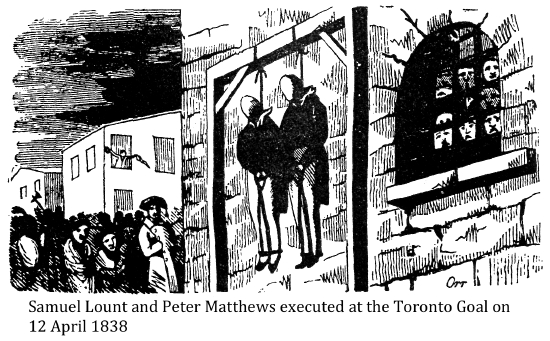

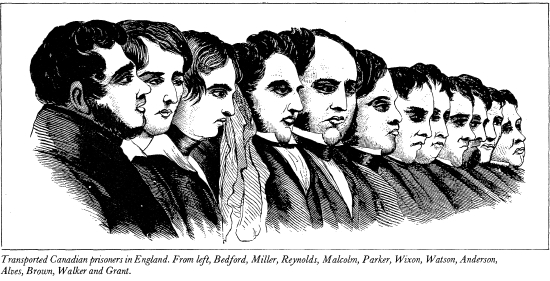
"A sentence of transportation subjects the Culprit not only to be deported to one of the penal Colonies, but when there, to be sent to a Penal Settlement (a place of special punishment) or to be employed at hard labour on the Roads or on the Public Works, or to be assigned to the service of settlers . . . In effect, a Convict is altogether deprived of his liberty, and is, to all intents and purposes, a Slave."
Sir George Arthur, 31 December 1837
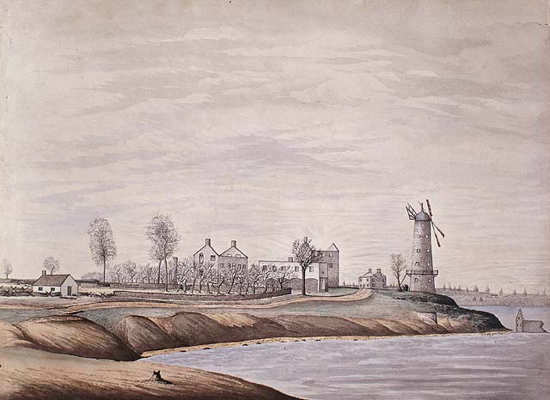
1838 11 13 Site of the Battle of the Windmill, Prescott. LAC, Acc. No. 1955-128-17, Henry Francis Ainslie sketched April 1839
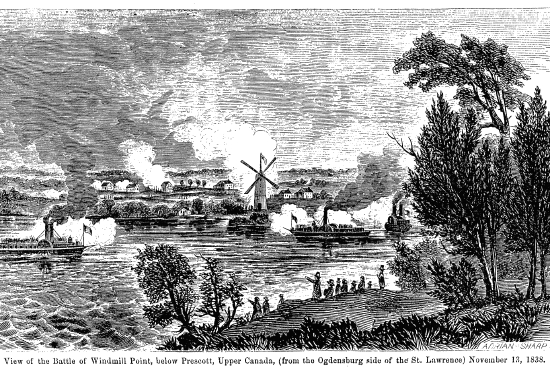
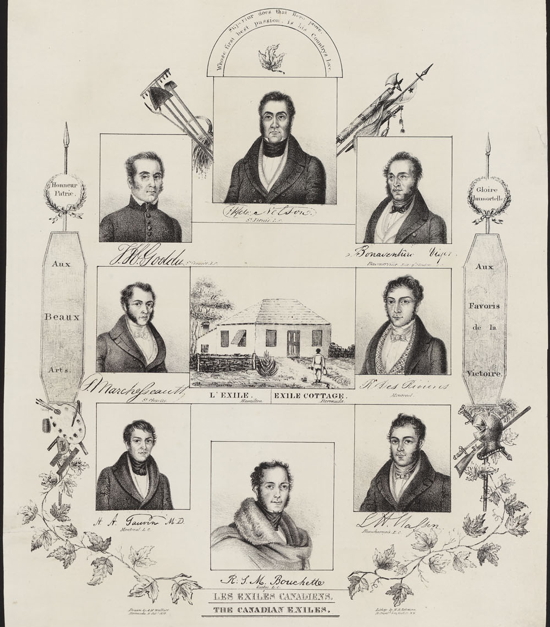
Les Exilés canadiens / The Canadian Exiles. LAC, Acc. No. 1991-201-39, A. H. Wallace, drawn in Bermuda ca. 31 October 1838
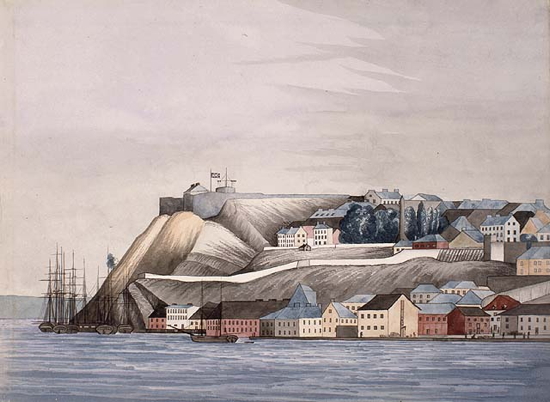
1838 View of Quebec City. LAC, Acc. No. 1955-128-7, Henry Francis Ainslie ca. June-August 1838
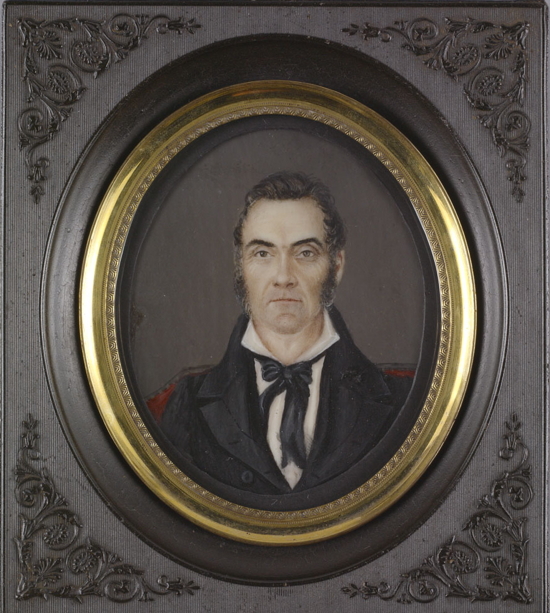
1837 Le docteur Wolfred Nelson. Doctor Wolfred Nelson during his Exile in Bermuda which lasted three months in the company of Mr Bouchette and six others-eight in all in the year 1838 for the part he took in the troubles of 1837, LAC, Acc. No. 1939-262-1, R. S. M. Bouchette 1838
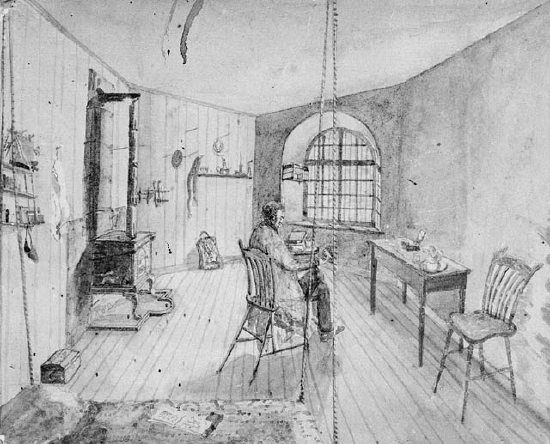
Emprisonnement de Robert Shore Milnes Bouchette, Montréal, 1837. Imprisonment of Robert Shore Milnes Bouchette, Montreal 1837. LAC, Acc. No. 1970-83-2. Robert Shore Milnes Bouchette 1837-1838
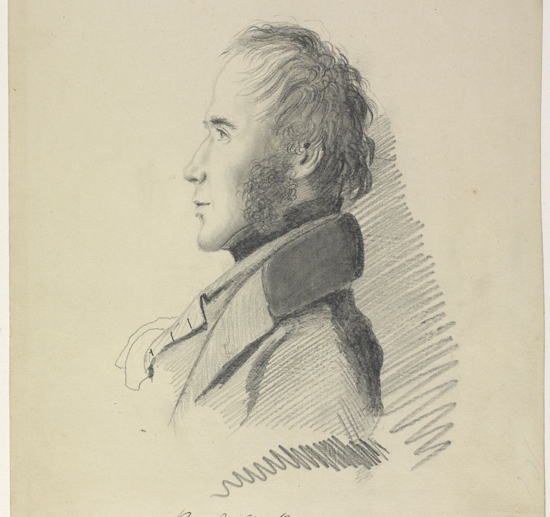
Robert Shore Milnes Bouchette. LAC, Acc. No. 1984-81-13 Source: Alberte G. Bourassa, Carmel Watson, Jeanne & Pierre G. Décarie. Jean-Joseph Girouard 1837-1838
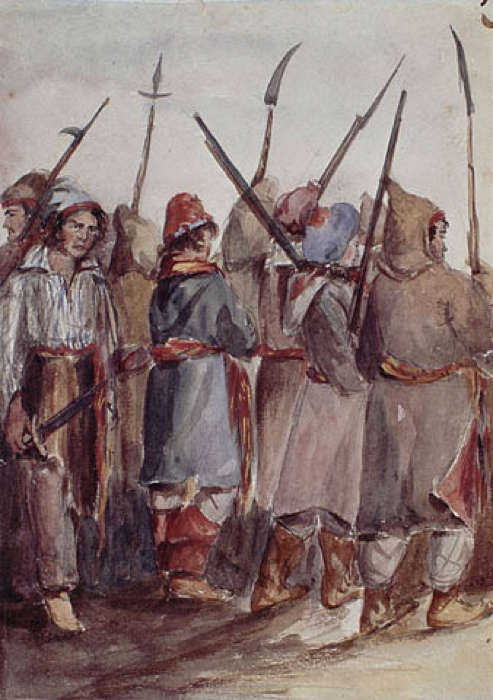
1838 Les Insurgés, à Beauharnois, Bas-Canada. The Insurgents, At Beauharnois, Lower Canada. LAC, 1990-215-24R, Katherine Jane Ellis November 1838
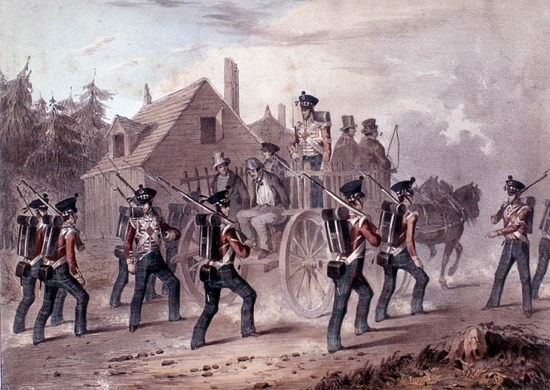
Le 71e Régiment de la Highland Light Infantry : lourd attirail de route. 71st Regiment, Highland Light Infantry: Heavy Marching Order with prisoners captured during the rebellion. LAC, 1991-116-4, James Henry Lynch 1840-1844
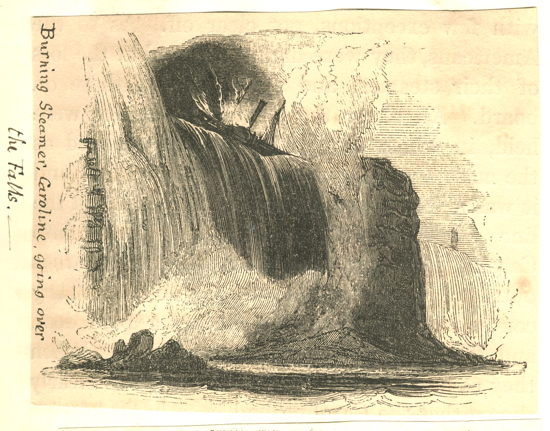
Burning steamer Caroline going over the Falls of Niagara. LAC Acc. No. 1939-447-48, c.1838
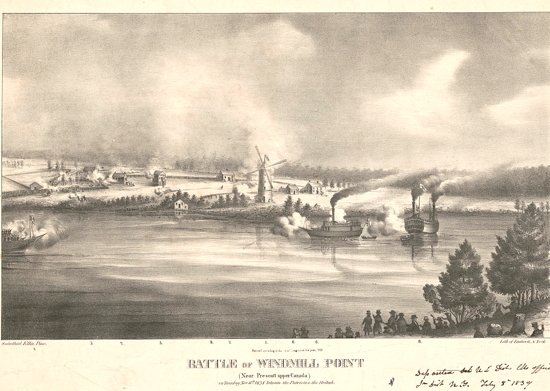
Battle of Windmill Point (near Prescott upper Canada) on Tuesday Nov. 13th 1838 between the Patriots and the British, George Endicott, New York, Library of Congress LC-DIG-pga-06271, 1839
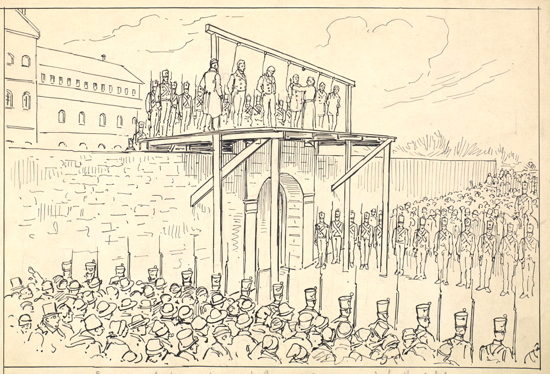
1839 02 15 Execution of rebels in front of the Montreal Gaol. LAC, Acc. No. 1989-466-61, drawing by Henri Julien, 1852-1908
"My country – may she never forget that for her we have died upon the scaffold! Patriots we have lived and patriots we die! Down with tyrants! May their domination cease! Long live Liberty! Long live Independence!"
The Chevalier de Lorimer, 14 February 1839
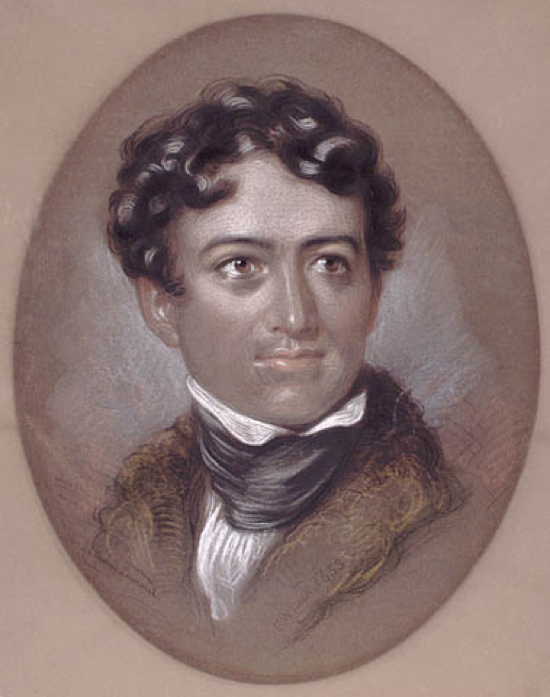
Lord Durham. LAC, Acc. No. 1970-127-1, Thomas Lawrence 1853
"I expected to find a contest between a government and a people; I found two nations warring in the bosom of a single state: I found a struggle, not of principles, but of races; and I perceived that it would be idle to attempt any amelioration of laws or institutions, until we could first succeed in terminating the deadly animosity that now separates the inhabitants of Lower Canada into hostile divisions of French and English."
Lord Durham, Report , 1839
"It certainly appeared too much as if the rebellion had been purposely invited by the government, and the unfortunate men who took part in it deliberately drawn into a trap by those who subsequently inflicted so severe a punishment on them for their error. It seemed, too, as if the dominant party made use of the occasion afforded it by the real guilt of a few desperate and imprudent men, in order to persecute or disable the whole body of their political opponents."
Lord Durham
"The Crown must consent to carry the government on by means of those in whom the representative members have confidence [responsible government]."
Lord Durham, Report, 1839
"There can hardly be conceived a nationality more destitute of all that can invigorate and elevate a people, than that which is exhibited by the descendants of the French in Lower Canada, owing to their returning their peculiar language and manners. They are a people, with no history, and no literature."
Lord Durham, Report, 1839
"I leave the Continent of America with my judgment perfectly convinced, that the inhabitants of Europe, Asia, and Africa, are right in their opinion that all men are not by nature equal – that the assertion of the contrary in America is a fallacy – and that the talent, industry and character must elevate individuals as they do nations, in the graduated scale of society."
Sir Francis Bond Head, address to the Members of the Colonial Parliament, 6 March 1838
"That I was sentenced to contend on the soil of America with Democracy, and that if I did not overpower it, it would overpower me, were solemn facts which for some weeks had been perfectly evident to my mind."
Sir Francis Bond Head
"It appears, then, from Lord Durham's own showing, that this 'family compact,' which his lordship deems it so advisable that the Queen should destroy, is nothing more nor less than that 'social fabric' which characterizes every civilized community in the world. It is that social fabric, or rather fortress, within which the British yeoman, farmer, and manufacturer is enabled to repel the extortionate demands of his labourers; and to preserve from pillage and robbery the harvest of his industry after he has reaped it!"
Sir Francis Bond Head, A Narrative , 1839
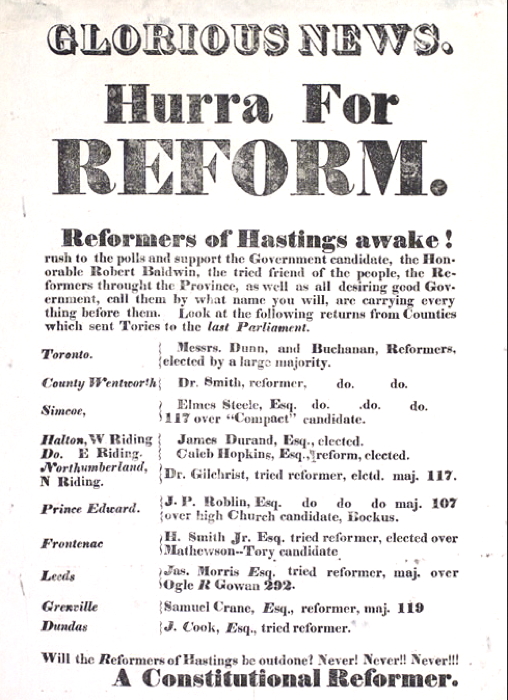
A Constitutional Reformer, Toronto Reference Library 1841. Election Reform.S
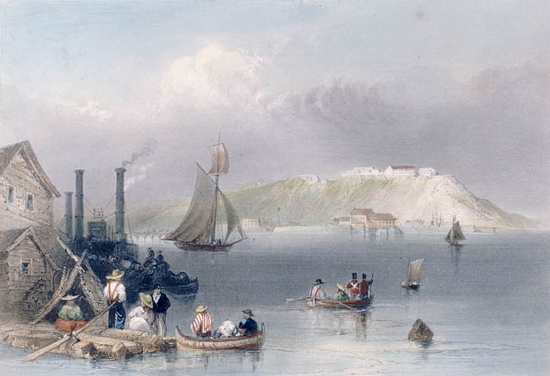
Citadel of Kingston, (from the St. Lawurence). Vue de la Citadelle de Kingston, depuis le Saint-Laurent, Kingston. LAC, Acc. No. 1970-188-867 W.H. Coverdale Collection of Canadiana, Robert Brandard 1841
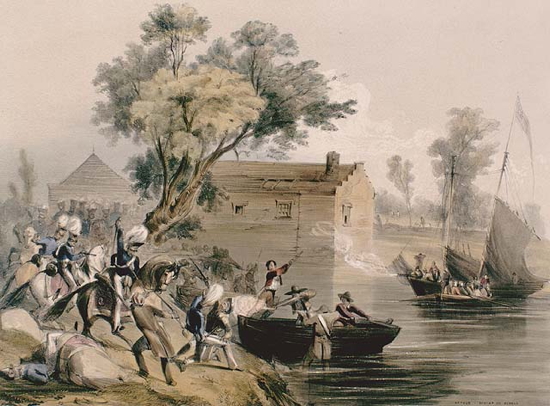
1840 Attack & defeat of rebels at Dickinson Landing, Upper Canada. LAC, Acc. No. R13133-296, John Richard Coke Smyth unknnown
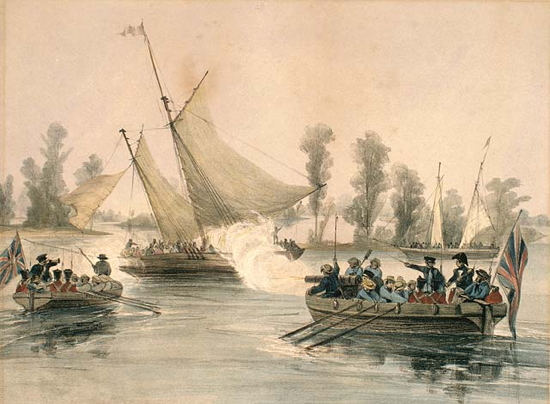
1840 Engagement in the Thousand Islands. Engagement dans les Mille-Îles., LAC, R13133-298, John Richard Coke Smyth 1840 During the Patriot War in 1837-1838 there were acts of piracy among the 1000 Islands.
"While 1848 was a year in which authoritarian rulers in Europe put down popular democratic uprisings, Britain acceded to the colonists' demand for self-government, making that year a landmark along Canada's path to democracy."
Peter H. Russell, Canada's Odyssey, p.119
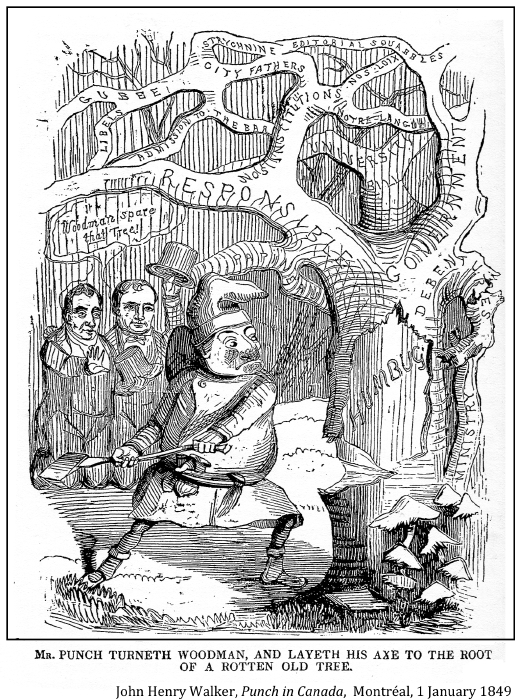
Mr. Punch is wearing a Liberty Cap
Middle left : Louis-Hippolyte LaFontaine and Robert Baldwin
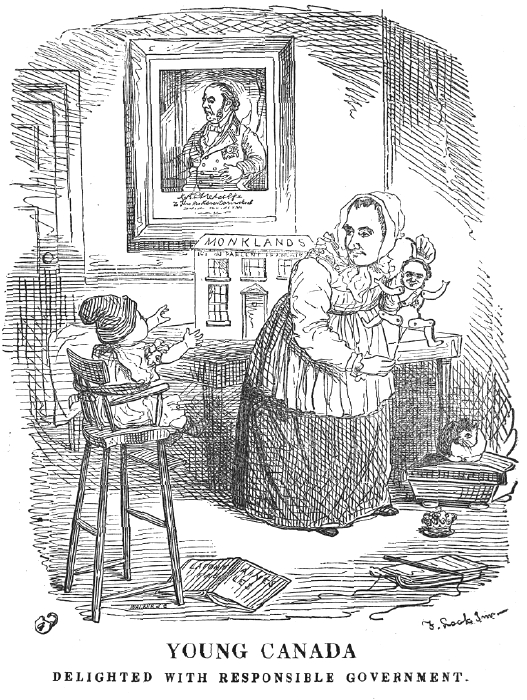
[Monklands – vice regal residence in Montreal; subheading "ici on parle français"
Portrait – late governor general Charles Metcalfe
Nanny – Louis-Hippolyte LaFontaine
Puppet – governor general Lord Elgin
Young Canada – sitting on a high chair
Book – LaFontaine fables]
Young Canada delighted with Responsible Government. Jeune Canada ravi par le gouvernement responsable. Punch in Canada, Montreal, 3 February 1849, LAC, C-092201, 1849-1850
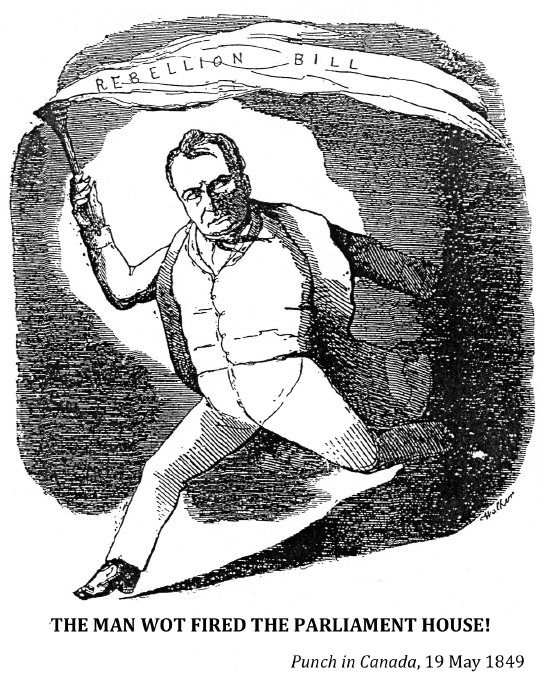
L'homme qui a incendié le Parlement. Louis Lafontaine introduced into parliament a bill to compensate residents of Lower Canada for the property damage they had suffered during the rebellion of 1837. John Henry Walker 19 May 1849
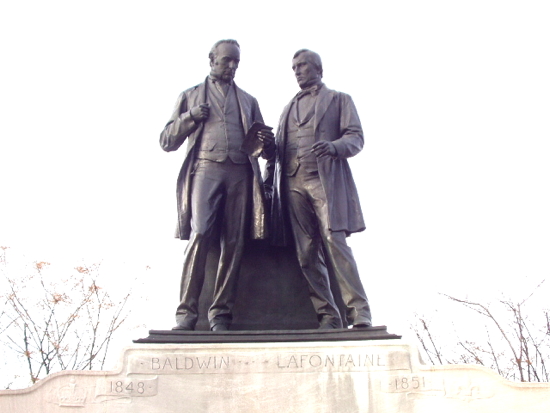
Baldwin and Lafontaine

L'incendie du parlement à Montréal en 1849, Montréal 25 avril 1849. Destruction of Parliament House, Montreal, April 25, 1849. LAC, Acc. No. R9266-1775 Peter Winkworth Collection of Canadiana, E. Hides ca. 1849
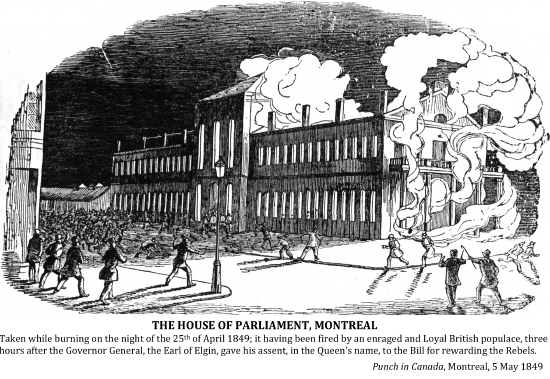
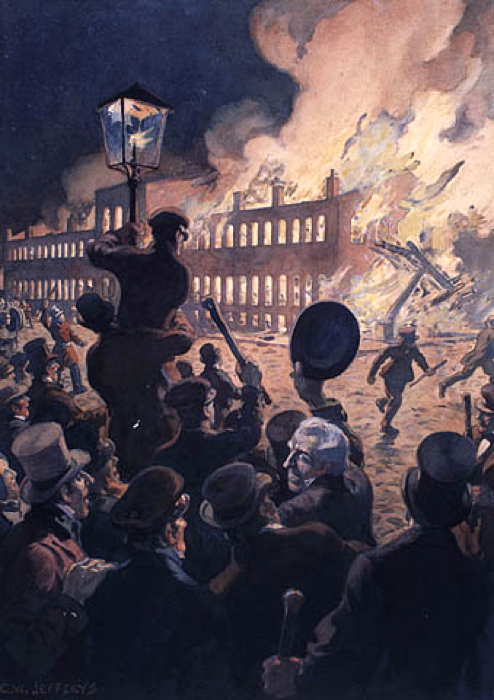
Feu des édifices du Parlement à Montréal en 1849. Burning of the Parliament buildings, Montreal in 1849. LAC, Acc. No. 1972-26-766, Charles William Jefferys ca. 1925
"Of all the remedies that have been suggested for the acknowledged and insufferable ills with which our country is afflicted, there remains but one to be considered. It propounds a sweeping and important change in our political and social condition involving considerations which demand our most serious examination. This remedy consists in a friendly and peaceful separation from British connection and a union upon equitable terms with the great north American confederacy of sovereign states."
The Annexation Manifesto, 1849
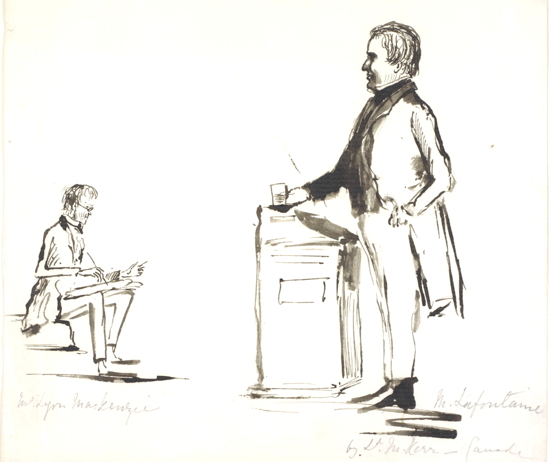
[Caricature Sketch of Louis-Hippolyte Lafontaine and William Lyon Mackenzie]. LAC, James Bruce, 8th Earl of Elgin, and family fonds (R977). Lord Mark Kerr 1849-1851
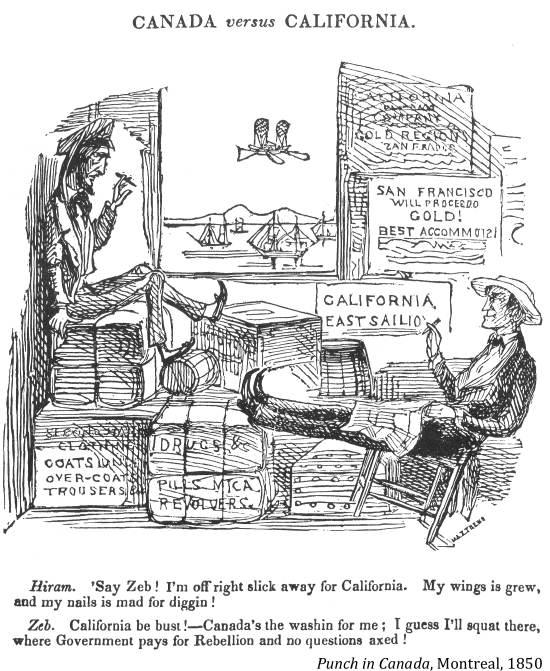
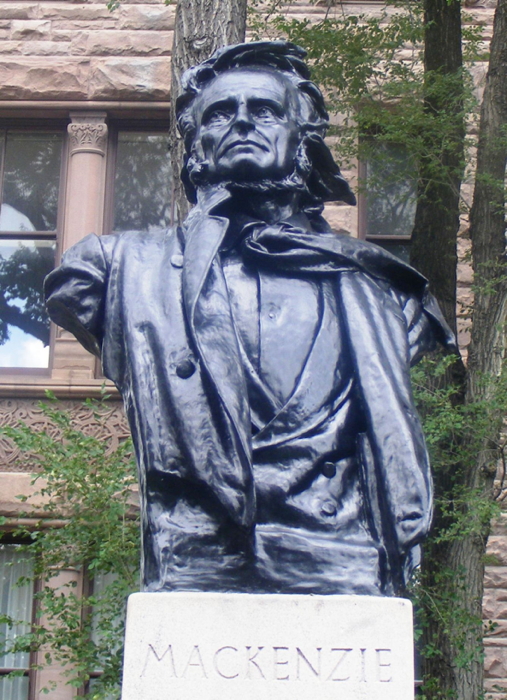
Statue of William Lyon Mackenzie outside the Legislative Assembly of Ontario in Toronto, Walter Seymour Allward 1940
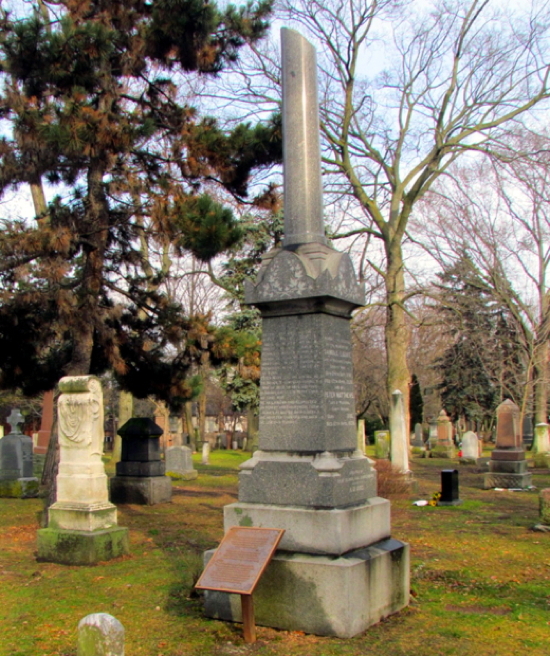
"He lived a Patriot, and died for popular rights."
Inscription, monument erected to honour Peter Mathews and Samuel Lount, St. James Cemetery, Toronto, 1893
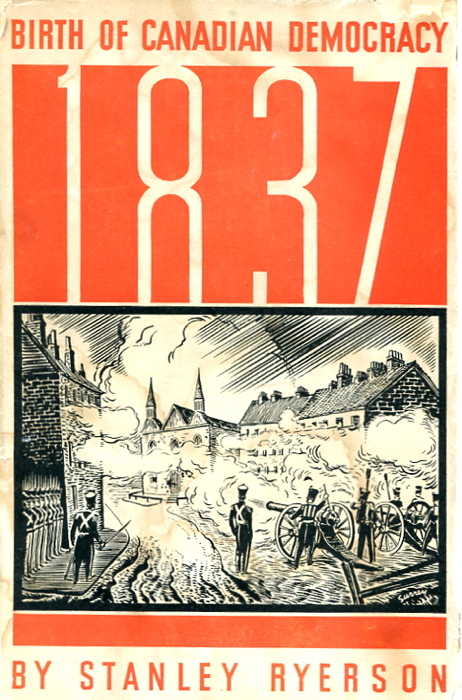
1837
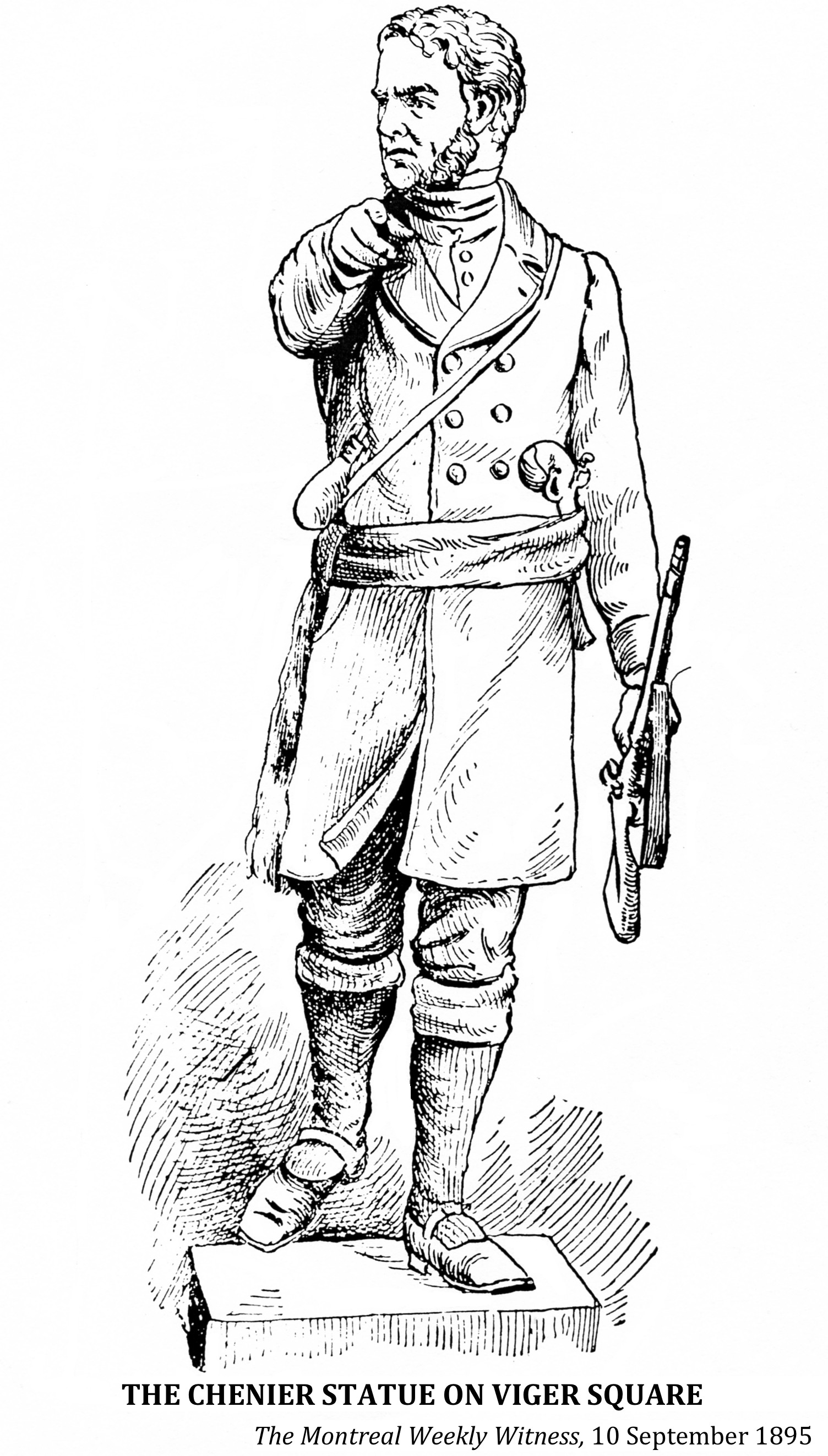
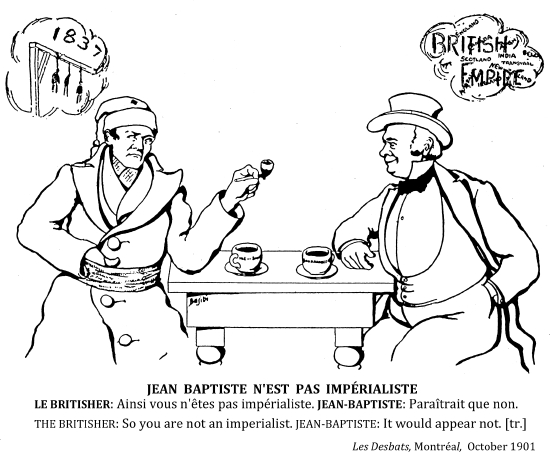
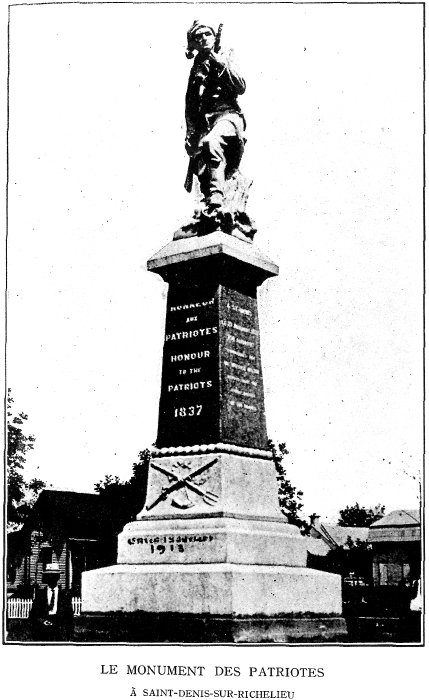
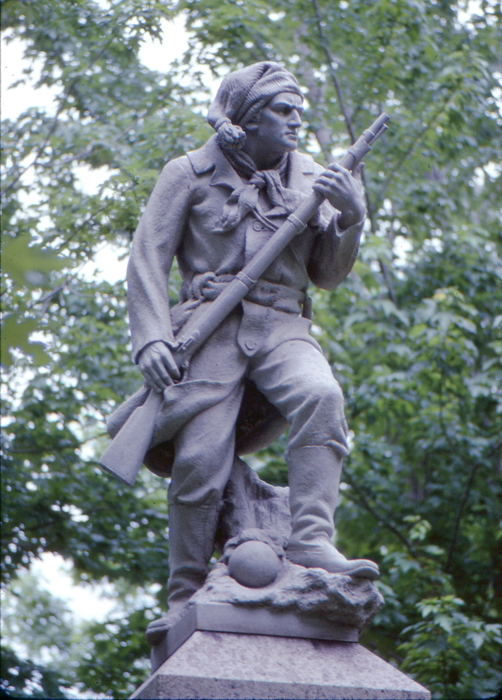
Honneur aux Patriotes 1837, Émile Brunet. Erected 1 July 1913 at Sainte-Denis-sur Richelieu, Québec. Charles Hou photo 1972
"The Battle of Saint-Denis had been a victory for patriotic rebels fighting for democratic rights against a draconian British regime."
Mark Starowitz, Making History.
"Is there a man amongst us who forgets that when Papineau was struggling for the rights of his race and for the constitutional liberty which we today enjoy, his principal coadjutors were John Nelson, the Scotsman, and O'Callaghan, the Irishman! . . . [or] when the peasants of St. Denis took up arms and faced the veterans of Waterloo, their commander was not a Canadien but an Englishman named Wolfred Nelson? And three days afterwards, when these same peasants were swept with the leaden hail at St. Charles, can it be forgotten that the man who again led them was an Englishman named Thomas S. Brown. "
Sir Wilfrid Laurier, speech, in Quebec, 1877
"We dedicate this monument [in Carabita Park, Sydney Harbour, Australia, for 82 rebels of 1837] as a record of our gratitude to all those who so rashly and so gallantly risked their lives for freedom."
Pierre Elliot Trudeau, address, 18 May 1970
"Matthews: Sam, Sam, we lost.
Lount: No Peter. We just haven't won yet."
Rick Salutin, Dialogue between Peter Matthews and Samuel Lount,
The Farmer's Revolt, 1975
"At eight o'clock today, Thursday, 12th April, 1838, Lount and Mathews were executed. The general feeling is in total opposition to the execution of those men. Sheriff Jarvis burst into tears when he entered the room to prepare them for execution. They said to him very calmly, 'Mr. Jarvis, do your duty, we are prepared to meet death and our Judge."
Egerton Ryerson, The Story of My Life, 1883
"He lived a Patriot, and died for popular rights."
Inscription, monument erected to honour Peter Mathews and Samuel Lount, St. James Cemetery, Toronto, 1893
"The decade 1827-37 was one of those periods in which it is possible to observe, step by step, the gradual accumulation of tension between contending classes, which finally can only be resolved by revolution."
Stanley B. Ryerson, The Birth of Canadian Democracy, 1937
"The winning of responsible government a century ago was neither a Colonial victory or a British defeat. It was the triumph of both British and Colonial reformers over conservatism, reaction and timidity on both sides of the Atlantic."
George W. Brown, 1942
"Considering the risks of life, reputation and property involved in rebellion, it is surprising how many did actually take up arms . . . how many more must have weighed the matter and decided that the risks were too great."
Professor Fred Landon
"The fact that there were so many peasants ready to shoulder their rifles, pitchforks or scythes at the first alarm, and face death on a battlefield, surely reveals the depth and gravity of the emotions sweeping the country."
Abbé Groulx
|



























































































